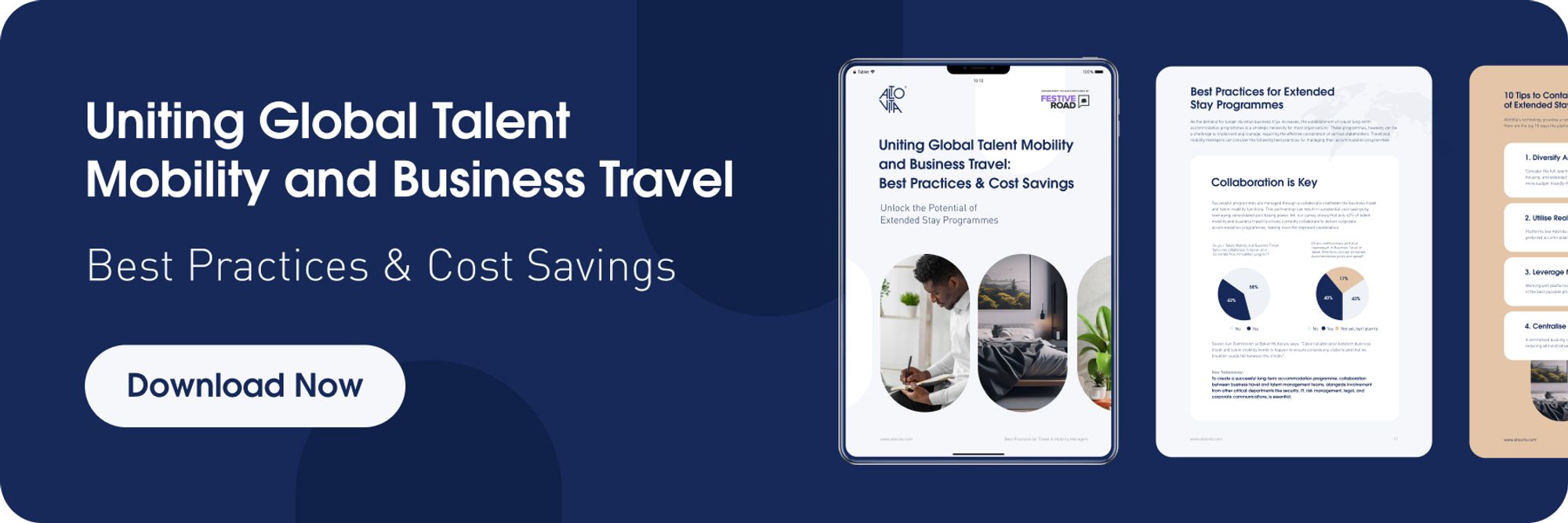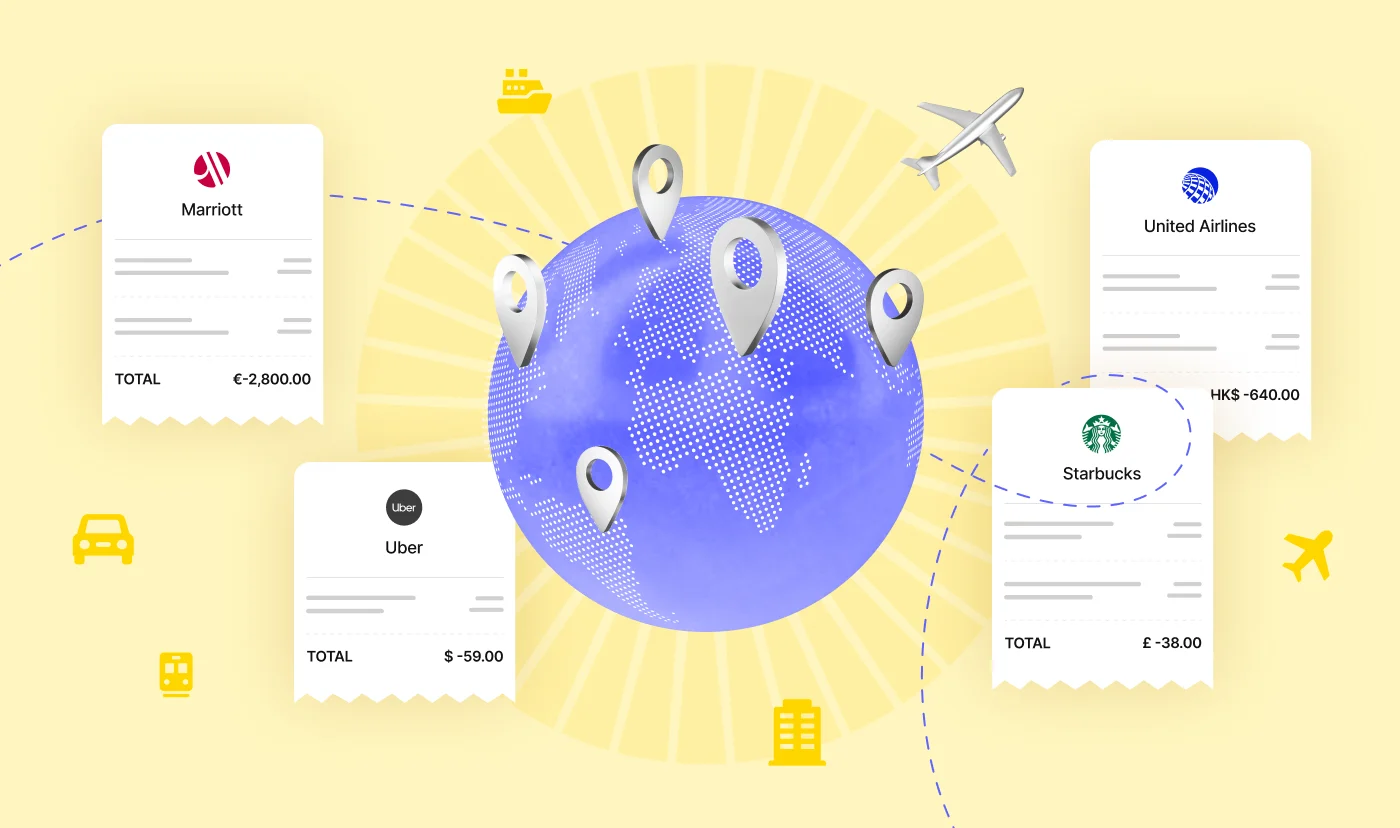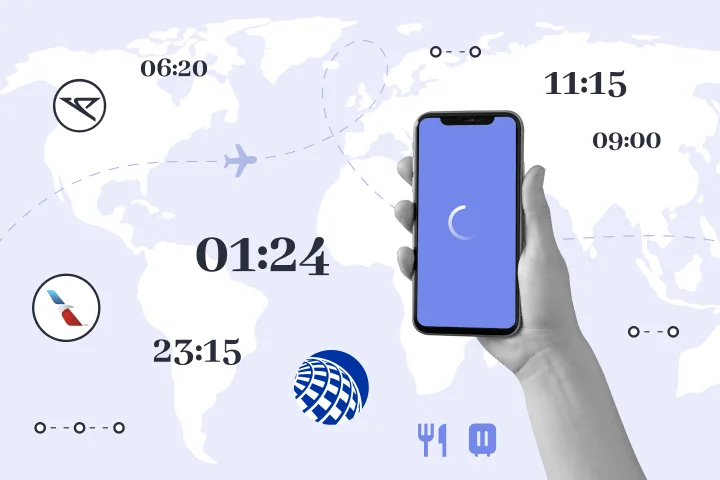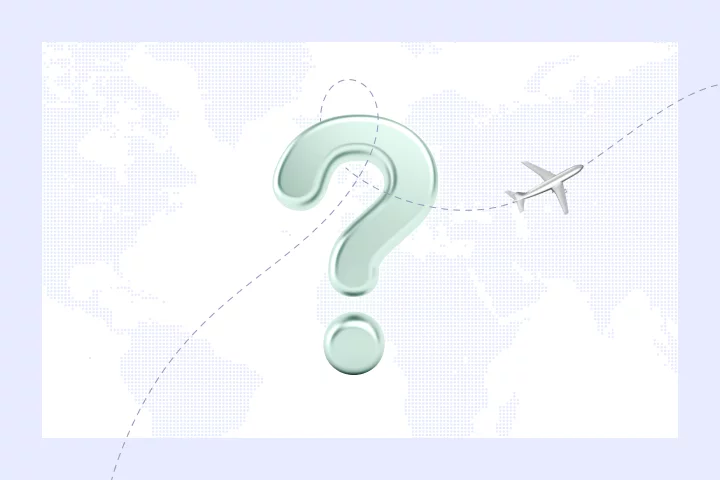The comeback of corporate travel: How should companies be planning?
It seems that, finally, the light at the end of the pandemic tunnel is in sight—at least in some parts of the world. In 2020, total global business travel expenses contracted by 52 percent, while managed corporate-travel spending in the United States plummeted 71 percent, or $94 billion. Last year, when we reported on the impact of COVID-19 on corporate travel, we projected that the road to recovery would be a long and uneven one.
Much has changed since then, thanks largely to progress on the vaccination front. Even though there’s much debate surrounding the timing of herd immunity in the United States, it’s indisputable that vaccination rates are on the rise across the country. At the time of writing, more than 40 percent of the US population has been fully vaccinated , with more than 50 percent having received at least one dose. Companies are starting to bring employees back to offices. Corporate executives are planning in-person meetings and gatherings with customers and colleagues.
In light of new developments, to what extent will videoconferencing replace business trips? How should corporations prepare for the next phase of business travel? While our insights from last year still hold, we’ve sharpened our understanding of how business leaders could be thinking about the postpandemic role of corporate travel. In this article, we identify four categories of business travelers—the “never left,” the “never returning,” the “fear of missing out” (FOMO), and the “wait and see” segments—and provide recommendations for how key players in the corporate-travel ecosystem can make effective plans in this context.

What’s changed: Increased vaccination is expanding flexible work arrangements
The most significant change shaping our thinking about the return of corporate travel is the rising vaccination rates in the United States and Europe. We project that the United States and the United Kingdom will slowly transition toward normalcy in mid-2021, with the rest of the European Union following shortly after (Exhibit 1).
Notwithstanding the risks presented by new virus strains and limited visibility into the duration of vaccine immunity, rising vaccination rates are ameliorating some of the travel anxiety. Many organizations are now proactively figuring out the future of work —which includes the role of business travel.
For many companies, COVID-19 has proven that more workplace flexibility is possible . Around 70 percent of executives said their companies will employ more temporary workers than before the pandemic, and 72 percent of executives report that their companies have started to adopt permanent remote-working arrangements for a subset of their employees. Nearly 40 percent of the workforce in the United States has the potential to work from anywhere. These signals and others suggest that many organizations are reevaluating working and organizational arrangements , including when, why, and how their employees should hit the road.
There’s no consensus, however, among business leaders about what to do with this newfound flexibility, and many organizations have not yet clearly communicated a vision for postpandemic work: around 30 percent of executives in a recent survey say they have not heard about specific plans for corporate travel after the pandemic, while another 28 percent described their companies’ plans as vague.
Four key segments in the return of corporate travel
Breaking down corporate trips into different segments can help travel planners and suppliers plan for the return of corporate travel. We’ve identified four different business-travel profiles, each sitting at a different point on the travel-resilience spectrum. Three indicators were used to define each archetype and determine its position on the spectrum: sector, travel purpose, and whether the trip was domestic or international. For travel purpose, if in-person interactions remain critical for a company, then the more resilient such business trips are. Some assumptions were made on how likely it was that some forms of corporate travel would recover rather than be substituted by videoconference technology.
The profile mix varies from company to company, and it’s possible for all four to coexist within the same organization, although some might feature more prominently in some companies and less in others.
- The “never left” segment. On one end of the spectrum, employees for whom travel is deemed essential for conducting business resumed their trips as soon as lockdowns eased. This category accounted for around 15 percent of all corporate travel expenses in 2019 and includes managers in manufacturing companies with a wide distribution of factories and plants and field-operation workers. Those who were reluctant to fly opted for rail and private cars instead.
- The “never returning” segment . On the other end, business travelers that contributed to one-fifth of business travel spending in 2019 present an enticing opportunity for corporations to permanently slash their corporate-travel budgets. Digital adopters who are able to maintain high levels of effectiveness while working remotely may never return to corporate travel. Furthermore, advances made in digital technologies that enhance oversight of outposts have paved the way for corporate travel to be further reduced. For instance, many chain restaurants found ways to minimize corporate travel by replacing in-person visits with virtual alternatives, as well as establishing more local oversight systems. They are likely to want to keep these significant cost savings; although a certain number of business trips will continue after the pandemic even in this segment, they will do so at much lower levels than before.
- The “fear of missing out” (FOMO) segment. The bulk of business travel (60 percent of business-travel expenditure in 2019)—which will likely drive the rebound of corporate travel—will be fueled by the FOMO segment: those traveling to cultivate important client relationships. Small and medium-size enterprises (SMEs) will likely increase corporate travel at much faster rates, as they are not subject to the heightened approval process that large enterprises have to follow. SMEs are likely to trigger a domino effect where one company’s resumption of business trips will catalyze its rivals’ return to work-related travel. Faced with intense competition, different players in the company (leadership, management, staff) coalesce to reinstate corporate travel at scale to seize a first-mover advantage over rival businesses. An April Global Business Travel Association (GBTA) member survey reported that more than 50 percent of respondents are developing or plan to develop a timeline for resuming travel, updated travel policies, or new safety resources and information for travelers.
- The “wait and see” segment. This segment consists of workers in relatively noncompetitive industries and roles; it contributed 5 percent of total business-travel spending in 2019. These corporate travelers tend to come from the public sector, professional associations, and nonprofits. During the pandemic, many professional associations were able to hold virtual events to replace in-person conferences and will likely be more cautious in their return to travel.
Taken together, the trajectories of the four travel categories confirm our earlier projection of an uneven recovery for corporate travel. Overall, we can expect a 20 percent reduction in corporate travel spending by 2023.
In addition, it’s worth noting that even within these segments, business-travel recovery will vary depending on the purpose and distance of the business trips (Exhibit 2). For instance, even for firms in the “never left” segment, overseas travel to attend international conferences has not returned because of government-imposed restrictions due to public-health concerns. Furthermore, given the uneven rollout of COVID-19 vaccines internationally, the return of international travel may be further suspended in regions with limited or delayed access to vaccines due to sustained public-health restrictions and/or disease outbreaks. On the flip side, “never returning” business travelers may still make exceptions for key events that are held regionally.
In the United States, a comparison of a multinational conglomerate’s internal and external travel spend and that of a private health insurer provides an example of how the recovery trajectory may differ from business to business (Exhibit 3). Internal travel encompasses trips taken for intracompany purposes, where employees participate in activities such as training, team building, or inspection of field operations. External travel, on the other hand, refers to trips employees take for engagements outside the company, including in-person meetings with clients and suppliers, trade conferences, and customer sales calls.
The multinational conglomerate we examined, a manufacturer of building products, had a total travel spend in 2019 of around $80 million. As a customer-driven business, the company spends the majority of its travel expenses on external travel. Much of this falls into the FOMO segment, which is already recovering at a faster pace this year relative to internal travel even though the overall travel expenditure remains depressed. The bulk of its internal travel was for the purposes of internal collaboration in 2019, a third of which is expected to be permanently eliminated, while the rest should gradually return over the rest of this year and 2022.

A McKinsey Live event on 'Returning to corporate travel: How do we get it right?'
Approaching the future of corporate travel: Four steps
Charting a safe and effective road map for future corporate travel requires all players to collaborate. Key players in the ecosystem—suppliers (including airlines, hotels, car-rental and rideshare companies), corporate-travel planners, travel intermediaries such as online travel agencies (OTAs), global-distribution-system (GDS) providers, and travelers themselves—need to master four critical skills: leveraging real-time data, planning with agility, aiming for comfort and safety, and communicating with clarity.
Leverage real-time data
Planning for the future can feel like flying through a fog of uncertainty, which makes it even more important for players to leverage real-time data to inform their decision making. Organizations could invest in data capabilities to identify and monitor the first signs of an acceleration in business travel.
Planning for the future can feel like flying through a fog of uncertainty, which makes it even more important for players to leverage real-time data to inform their decision making.
OTAs and GDS providers may be worth exploring as new data sources. Travel intermediaries such as these are uniquely situated to provide aggregate data for each industry. For instance, they can inform a corporate-travel planner how many seats are being booked by the rest of the company’s sector, signaling whether the company is ahead of or behind the curve. Many corporate-travel planners are also concerned about the fluctuations in the cost and availability of tickets, given the volatility of flight schedules during this time. Intermediaries can provide data that suggest which flights are more likely to stay on an airline’s schedule, helping clients build more agility into their decision making. Intermediaries may be able to create a new revenue stream from these data.
Would you like to learn more about our Travel, Logistics & Infrastructure Practice ?
Real-time data also help suppliers of corporate travel, such as air carriers and hotels, become more agile. As corporate travel returns, these suppliers will need to deploy the right resources in real time to match demand, which may shift abruptly. For example, one airline made a costly mistake by being unprepared for the sudden spike in demand for leisure flights over the recent Easter holiday. As recovery will likely be uneven, airlines will have to figure out how to have aircraft, pilots, and crew on standby so they can increase capacity quickly whenever there’s a need. Organizations can meet regularly to discuss data-driven insights and align on next steps.
Embed agility into planning
It pays to have a detailed plan and strategy for different recovery scenarios in place. When demand picks up, many firms may find that they don’t have the time to pause and think through their strategies.
When it comes to organizing business trips for employees, corporate-travel planners will need to take into account four considerations:
- First, the factors that affect whether corporate travel should increase: for example, local and regional infection levels, customer demand, and competitive actions.
- Second, the relevant data sources used to evaluate these factors: these could include public-health indicators, customer surveys, data from travel partners on industry trends and competitor behavior, and real-time pricing from GDSs consistent with typical corporate agreements, even as airline-fare classes go through realignments.
- Third, company policies on business travel: What distance-based policies should staff adhere to? Should they use rental cars, rideshares, taxis, or flights? When should they wear masks or engage in group gatherings? How (and should) companies distinguish between what activities vaccinated and unvaccinated employees can participate in?
- Fourth, information needed by travelers: this includes websites, travel help desks, and messaging.
A US health-products wholesaler and manufacturer provides an example of how these considerations work together. Currently, the company’s factories are open, while corporate offices remain closed and corporate travel is at a standstill. The company recently decided to stage-gate the resumption of corporate travel, starting with executives. Critical sales meetings and conferences will be in the next wave of business trips, followed by general sales and internal corporate activities, and finally, internal training and events. The level of corporate travel varies by state, based on local infection and vaccination rates. The company also set up tracking codes in its customer-relationship-management system to monitor when sales are won or lost due to competitive travel, which involved working with its corporate travel agent to get data on corporate-travel bookings.
The company instituted different policies for each level, including when masks must be worn, the permitted group size for indoor gatherings, and what lodging choices should be made (for example, home shares are avoided for safety and sanitation reasons). The company is developing internal brochures and a communications plan to keep its employees informed.
Personalize experiences based on safety and comfort
Safety and comfort are crucial elements in the travel experience, and they can sometimes pull in opposite directions. More can be done to bridge this gap. Both employers and travel companies could find ways to give passengers peace of mind and improve comfort and convenience. The guiding principle here is giving the traveler greater control over decisions that affect their sense of comfort and security.
For instance, airlines can personalize flight experiences by improving the functionality of their mobile apps to allow passengers to preorder their meals and snacks or make special requests. Hotels may let guests decide on the frequency and timing of housekeeping. They might consider offering initiatives that improve guests’ physical and mental well-being, for example, by offering virtual trainers to guide meditation or fitness practices. Suppliers could also consider offering radically transparent flexibility policies and allow customers a greater range of options with different associated fees for cancellations and changes.
Communicate with clarity
Even the most seasoned travelers have to accept that traveling has changed. Masks have become ubiquitous, and border restrictions, boarding procedures, and hygiene requirements seem to be ever changing. It’s critical that organizations communicate clearly what their corporate-travel policies are at any given moment in time, for every stage of the journey—from pre- to post-trip.
It helps for organizations to be extra proactive in communicating any type of change, whether regarding company-wide strategic policies or more granular details such as the company’s preferred rideshare or car-rental options for corporate travel. When changes in operations are made, companies can take special care to ensure the availability of amenities. Leadership can play a prominent role in modeling how to travel in this new reality by clearly reiterating company policies. Information websites, travel help desks, and easily digestible infographics could all be used to get the message across. Keep channels of communication open and allow employees to give feedback and raise concerns as and when they arise.
Employees, too, will go through an adjustment period as they resume their business trips. Leadership can communicate that it’s OK for them to take it slowly and that they should raise concerns if they ever feel unsafe.
Some corporate travelers will find they have to adapt quickly to the many changes in business travel, while others will have the luxury of easing themselves in over a longer period. Unpredictability will continue to be a fact of life, but one thing is certain: if everyone plays their part well (and smartly, by leveraging the technologies and processes at our disposal), the resumption of corporate travel is possible.
Jenna Benefield is a consultant in McKinsey’s Philadelphia office, Vik Krishnan is a partner in the San Francisco office, Esteban Ramirez is the capabilities and insights team leader in the San Jose office, and Matthew Straus is an associate partner in the Chicago office.
The authors wish to thank Guenter Fuchs, Jennifer Heller, and Jillian Tellez for their contributions to this article.
This article was edited by Jason Li, a senior editor in the Shanghai office.
Explore a career with us
Related articles.

The travel industry turned upside down: Insights, analysis, and actions for travel executives

For corporate travel, a long recovery ahead

Corporate travel: The long road to recovery
- Search Search Please fill out this field.
What Is Corporate Travel Management?
Things to consider in corporate travel management, options for corporate travel management.
- Challenges of Corporate Travel Management
Tips for Creating a Corporate Travel Management Policy
Budgeting and reducing costs for corporate travel, the bottom line.
- Corporate Finance
A Complete Guide to Corporate Travel Management
Organize Your Employees’ Travel Itineraries and Manage Business Travel Efficiently
:max_bytes(150000):strip_icc():format(webp)/gregdaughertyphotoforinvestopedia__greg_daugherty-5bfc262546e0fb0051bce9d3.jpg)
Investopedia / Joules Garcia
Travel is a major expense item for many companies, and while teleconferencing via Zoom and other online platforms may have eliminated the need for some trips, it remains essential for a wide range of business purposes, such as industry conferences and trade shows, critical sales calls, and certain meetings.
Corporate travel management (CTM) is one way that companies large and small can attempt to control and cut down on their travel costs. If you’re considering implementing a corporate travel management program for your business, here is what you need to know about how it works.
Key Takeaways
- Corporate travel management is a way for companies to try to control their travel costs and cut back on them if necessary.
- Some companies handle this function themselves, while others outsource it to specialist companies.
- Corporate travel managers can be involved in setting itineraries, booking flights and hotel rooms, and managing other travel-related costs.
- Today, many companies are concerned with not only the financial costs of employee travel but also its environmental impact.
Corporate travel management refers to processes that businesses put into place to oversee their employees’ travel and entertainment (T&E) expenses and ensure that they comply with the company’s policies. That can include approving (or rejecting) travel plans, arranging itineraries, purchasing tickets, and auditing expense reports.
A large company might have a separate department dedicated to corporate travel management, while a smaller one may assign the tasks to their human resources and accounting departments. Still others may outsource these functions to third-party travel management companies.
While the COVID-19 pandemic resulted in significant cutbacks in business travel, an October 2023 survey by the Global Business Travel Association found that 84% of companies said their business travel had “largely” or “mostly” returned to pre-pandemic levels.
Companies can choose to exert varying degrees of control over their employees’ travel, from fairly general guidelines on spending limits to very specific, step-by-step procedures, including which travel suppliers to use. Here are some of the matters they may take into consideration.
Itineraries
A business travel itinerary is a summary of a proposed trip, including travel dates and times, flight numbers, hotel bookings, meeting appointments and contact information, and so forth. Corporate travel managers may develop itineraries in collaboration with employees, making sure that each aspect complies with company policies. A written itinerary is also a handy reference for employees to bring with them on their trips.
Transportation
Corporate travel managers will often make transportation arrangements on behalf of employees, much like a travel agent might for someone’s personal vacation. Because they may control a high volume of business, they can have more leverage in negotiating with suppliers, such as airlines or rental car companies. They may also have special arrangements with certain suppliers, and the company might require its employees to use those suppliers whenever possible.
Even if they don’t have such arrangements in place or much power to negotiate prices, they may have tools at their disposal for searching out deals and discounts that individual employees don’t have. For example, they may have access to an online global distribution system (GDS), such as Amadeus, Sabre, or Travelport, allowing them to compare multiple carriers at the same time.
Accommodations
As with transportation providers, corporate travel managers can help arrange hotel bookings, often securing discounts that would be unavailable to employees individually. Hotel prices and availability are also provided on GDS platforms, which can save employees a lot of time and effort calling around to book a room.
Meetings and Events
For companies planning meetings and other events, corporate travel managers can book venues and assist attendees with their travel arrangements. Some companies may have separate travel management and event planning departments or merge the two into a single department. They can also farm out these functions to third-party companies that specialize in arranging events and have deep experience and contacts in that area.
Costs and Reporting
Since keeping costs under control is a major reason for implementing a corporate travel management program, setting spending policies and enforcing them is one of the managers’ key responsibilities. Employees must generally submit expense reports at the conclusion of their travel, which travel managers can then review.
Keeping accurate records, and receipts where necessary, is also important for tax reporting purposes. Companies can generally deduct employees’ travel expenses if they have a clear business purpose and are “ordinary and necessary” and not “lavish or extravagant.”
In many cases, companies will provide corporate credit cards for employees to use during their travels. Corporate credit cards can make it easier for companies to collect the information they need for reporting purposes, and spare employees the cost and bother of putting travel expenses on their own credit cards and having to wait for reimbursement.
Policy Compliance
Most companies of any size will have a written travel policy that they expect their employees who travel for business to become familiar with. This document will cover matters such as any required approval process before starting on a trip, spending limits, preferred travel suppliers, expenses that are reimbursable (or not), rules on the use of a corporate credit card, and how to fill out and submit an expense report at the conclusion of a trip. Written travel policies serve the dual purpose of controlling company costs and saving employees unwelcome surprises over expenses that the company won’t reimburse them for.
Beyond specific travel-related policies, corporate travel can be affected by broader company policies. For example, a 2023 Deloitte study reported, “Climate concerns will likely put a cap on corporate travel gains for several years to come. Four in 10 European companies and a third of U.S. companies say they need to reduce travel per employee by more than 20% to meet their 2030 sustainability targets.”
Travel Support and Assistance
In addition to helping employees with the logistical and financial aspects of travel, corporate travel managers can provide other forms of support, including help in a medical or other emergency. Many large corporate travel departments and third-party companies have support services available 24/7, just in case.
As mentioned, companies don’t have to take on all (or any) of these responsibilities themselves but can hire another company to handle it for them. While that represents an added cost, a company that specializes in corporate travel is likely to bring greater expertise to the role and may find cost savings that would otherwise go unnoticed.
Companies can also buy travel management software programs that allow employees to book their own travel arrangements and that may link to the company’s accounting software to simplify expense reporting. Such software can also flag and even reject any expenses that don’t comply with company rules.
If they don’t have access to professional GDS platforms, travel managers can also make use of regular consumer booking sites, such as Expedia and TripAdvisor.
Challenges of Corporate Travel Management
While corporate travel management will often benefit a company from a financial perspective, it does present challenges.
For example, because it takes away some of the autonomy that employees may have become accustomed to in planning their own trips, it can cause them to feel mistrusted or micromanaged and make travel seem like more of a burden. In addition, for corporate travel management to be effective, it requires that the people who oversee it know what they’re doing, which may require not only training but also frequent refresher courses to keep up with the rapidly changing travel industry.
A good corporate travel management policy will lay out as specifically as possible the company’s rules for arranging flights and other transportation, booking hotel accommodations, and expensing other reimbursable travel-related costs, such as meals and entertaining. Any caps on costs should be regularly revisited and revised as necessary to keep up with inflation and changes in the marketplace.
The policy should describe a clear process for having travel approved in advance, if that’s required, and submitting expense reports after the trip for timely reimbursement.
An effective policy will also strive to avoid situations in which lower-level employees feel they are subject to stricter or more penny-pinching rules than higher-ups.
Finally, it’s important that employees be encouraged to read the policy and know the rules. They may also be given the opportunity to provide feedback on ways that the rules can be improved next time the policy is revised.
Corporate travel managers not only play a role in monitoring how a company’s money is being spent and looking for ways to cut its costs. They also often have a major say in setting the company’s annual travel budget, based on previous years’ needs and anticipated pricing changes throughout the travel industry.
Today that may involve weighing in on when a virtual meeting can substitute for an in-person one. A 2023 Morgan Stanley survey of 100 global corporate travel managers found that they planned to replace 17% of their corporate travel with virtual meetings in 2024 for reasons “ranging from cost savings to lower carbon footprints.”
Why Is Corporate Travel Important?
While many companies learned during the COVID-19 pandemic that they could sometimes substitute virtual meetings for in-person ones, they have also found that travel can more than justify its cost in many instances . As Harvard Business School Associate Professor Prithwiraj Choudhury remarked in a recent interview on the university’s website, “Even in a hybrid world, even in a world of work-from-anywhere, we still need to occasionally meet colleagues in person for social purposes.” In addition, face-to-face meetings can help establish more profitable and productive relationships with a company’s key customers and suppliers.
Who Handles Corporate Travel?
Companies handle corporate travel in a variety of ways. Many have created internal departments dedicated to corporate travel management, while others outsource that role. However, many companies still leave most of the decisions to individual employees. One 2023 survey by Morning Consult Research Intelligence reported, “Over half (51%) of those who travel frequently for work book on their own using a platform of their choice.”
What Does Corporate Travel Include?
Corporate travel can include both domestic and international trips that have a business purpose. It generally doesn’t include employees’ everyday commuting. Commuting costs are not tax-deductible for employees, but companies can choose to subsidize them up to certain limits through what the Internal Revenue Service (IRS) calls qualified transportation benefits. Those benefits are not taxable to the employee, but the employer doesn’t get any tax deduction for providing them.
Corporate travel is expensive, but many companies find that its benefits outweigh the costs. Corporate travel management is one way that companies can try to keep those costs under control and get the most value from their travel budgets. While many companies have embraced corporate travel management programs, others still leave most decisions to their individual employees.
Global Business Travel Association. “ Global Business Travel Industry Sees Rebound in 2023 with Shifting Challenges and Opportunities for 2024 .”
American Express. “ What Is Corporate Travel Management and Why Do You Need It? ”
Internal Revenue Service. “ Topic No. 511, Business Travel Expenses .”
Deloitte. “ Navigating Toward a New Normal: 2023 Deloitte Corporate Travel Study .”
Oracle NetSuite. “ What Is Corporate Travel Management? ”
Morgan Stanley. “ 2023 Outlook: Business Travel Bounces Back .”
Harvard Business School. “ Why Business Travel Still Matters in a Zoom World .”
Morning Consult Research Intelligence. “ Business, but Not as Usual ,” Page 18.
Internal Revenue Service. “ Publication 15-B: Employer’s Tax Guide to Fringe Benefits ,” Page 22.
:max_bytes(150000):strip_icc():format(webp)/Term-Definitions_corporategovernance-91024c6d6fb242f7bdc363422590fd11.png)
- Terms of Service
- Editorial Policy
- Privacy Policy
- Your Privacy Choices
See how Cvent can solve your biggest event challenges. Watch a 30-minute demo.
- Request demo
- Find event venues

The 2024 Guide to Corporate Travel Management

Did you know that the global business travel market is projected to hit a staggering $829.5 billion by 2027, growing steadily at a rate of 3% over seven years? It's a massive industry that underpins the operations of countless companies worldwide.
Yet, despite its importance, corporate travel management often feels like a never-ending administrative headache. Managing it can be overwhelming and time-consuming, from booking flights and arranging accommodations to tracking expenses and ensuring employee safety.
However, it doesn't have to be this way.
Business travel has the potential to be a strategic tool for growth, fostering collaboration, and boosting morale among employees. So, what's causing the disconnect? And, more importantly, how can you bridge this gap?
In this post, we'll delve into the biggest pain points of corporate travel management and offer practical solutions and insightful tips to address them effectively. By exploring streamlined processes, leveraging the right business travel solutions , and prioritizing both efficiency and employee experience, we'll show you how to transform your travel program from a chaotic scramble into a well-oiled engine of success.

What is Corporate Travel Management?
Corporate travel management involves overseeing and organizing employees' travel and entertainment expenses to ensure adherence to the company's policies. It includes business travel planning , such as organizing itineraries, buying tickets, and checking expense reports.
Larger companies often have dedicated departments for this, whereas smaller businesses might rely on their human resources and accounting teams. Some companies choose to outsource these responsibilities to specialized travel management companies.
Core Elements of Corporate Travel Management
The core elements of corporate travel management revolve around processes and policies designed to streamline and oversee all aspects of business travel. These elements ensure that travel is cost-effective, efficient, and aligned with the company's objectives and policies.
Let's take a closer look at these key components:
- Policy Development and Compliance: Establish clear, comprehensive travel policies that define allowable expenses, preferred vendors, booking procedures, and compliance measures. These policies help set expectations and guide employee behavior during business travel.
- Travel Approval Process: Implement a system for approving travel requests to ensure trips are necessary, budgeted, and aligned with business goals. This process often involves multiple levels of approval, depending on the purpose of the travel and cost.
- Booking and Reservation Management: Centralize or streamline the booking of flights, hotels, car rentals, and other travel services. This can involve in-house resources, corporate travel agencies, or specialized travel management software to secure the best rates and ensure policy compliance.
- Expense Management and Reimbursement: Create a system for tracking, submitting, and reimbursing travel expenses. Use expense report software to simplify the submission process, ensure accuracy, and maintain records for auditing purposes.
- Risk Management and Duty of Care: Ensure the safety and security of traveling employees by assessing travel risks, providing travelers with information and support, and having plans for emergencies. Monitor global events and implement safety protocols.
- Data Analysis and Reporting: Collect and analyze travel data to monitor spending, identify trends, and uncover opportunities for cost savings. Reporting helps companies understand travel patterns, negotiate better rates with vendors, and improve travel policies.
- Vendor Negotiations and Relationships: Establish and maintain relationships with preferred travel service providers, such as airlines, hotels, car rental companies, and travel agencies, to secure competitive rates, special discounts, and favorable terms.
- Technology Integration: Utilize corporate travel technology for booking, expense reporting, policy compliance, and traveler safety. This technology solutions can automate many aspects of travel management, improving efficiency, and user experience.
- Traveler Support and Communication: Support employees before, during, and after their trips, including travel advisories, 24/7 emergency assistance, and feedback mechanisms to improve the travel program.
What are the Benefits of a Corporate Travel Policy?
A well-defined corporate travel policy is essential for managing business travel effectively. It ensures travel expense management, compliance, efficiency, employee travel management, and satisfaction, ultimately contributing to a successful travel program.
Here are some benefits of having a corporate travel policy:
For Businesses:
- Cost Control: Establishes clear spending limits and preferred vendors, leading to cost savings and budget predictability.
- Compliance: Ensures adherence to internal policies and external regulations, mitigating legal risks.
- Efficiency: Streamlines travel booking and expense management processes, saving time and resources.
- Ensure Duty of Care and Traveler Safety: Promotes employee safety and well-being through travel guidelines and emergency protocols.
- Traveler Satisfaction: Provides clear expectations and support, fostering a positive travel experience for employees.
For Employees:
- Clarity and Guidance: Understands company expectations and procedures for travel arrangements and expenses.
- Budget Awareness: Makes informed decisions about travel choices within allocated budgets.
- Peace of Mind: Feels supported and secure, knowing they comply with company policies and have access to resources in case of issues.
- Efficiency: Benefits from streamlined booking processes and clear expense reporting procedures.

Developing a Corporate Travel Policy: Tips and Best Practices
When developing a corporate travel policy, follow these tips and best practices:
- Be Specific: Provide concrete guidelines for booking flights, hotels, meals, and entertainment expenses.
- Streamline Approval and Reimbursement: Implement a transparent process for travel approval and expense report submission.
- Be Equal and Fair: Maintain consistent guidelines to foster equity and trust across all levels.
- Remember Employee Engagement: Promote awareness through training sessions and encourage feedback during revisions.
- Ensure Safety: Include safety protocols and emergency contact information in the policy.
- Focus on Sustainability: Encourage eco-friendly travel options.
- Embrace Technology: Integrate travel booking and expense management software for a seamless experience.
Regularly review and update the policy to reflect changing needs and industry trends.
6 Common Challenges in Corporate Travel Management
Corporate travel presents ongoing challenges for many businesses, from handling numerous requests to controlling expenses. Even with processes seemingly managed, the time and effort invested in what should be straightforward tasks can be substantial.
It's common to encounter the following issues:
- Handling Numerous Requests: Typically, someone is tasked with overseeing travel arrangements. It could be a dedicated travel manager or administrative team. The challenge arises with the volume of requests from various departments in the company, often communicated through different channels like email, Slack, or in-person visits, creating a disorganized and time-consuming workflow.
- Tracking Approvals: Ensuring travel is approved by the appropriate personnel adds layers to the process. Travel management systems can streamline approvals by electronically notifying and collecting consent from managers, simplifying the process.
- Controlling Costs: Travel is essential for business growth, so managing expenses becomes crucial. Often, companies overspend by not accessing lower-cost options, opting for business-class accommodations, and bookings through travel agents. Exploring more cost-effective avenues, like discount websites, can help manage budgets more efficiently.
- Empowering Employees to Book Travel: Allowing employees to book their travel can reduce administrative burdens and increase satisfaction by giving them choices and control over their itineraries.
- Flexibility: Balancing control with freedom is key. Offering a broad range of travel options without strict restrictions can save money and keep employees happy by providing more choices.
- Minimizing Errors: Travel bookings and expense reporting mistakes can be time-consuming and costly. Ensuring clear approval trails, keeping meticulous records, and using collaborative tools can help reduce these errors and the logistical nightmare they cause.
Overcome Corporate Travel Management Challenges with Technology
Corporate travel presents ongoing challenges for many businesses, from handling numerous requests to controlling costs and minimizing errors. However, technology solutions can help overcome these challenges by streamlining travel arrangements, managing expenses, saving time, and reducing errors.
Corporate travel management software helps businesses streamline their travel processes. It can:
- Streamline travel arrangements: Corporate travel management software can help employees book, manage, and track trips without contacting specialists.
- Manage travel expenses: It allows businesses to manage travel-related expenses while following corporate travel policies.
- Save time: Offers a centralized platform that allows employees to make reservations, track itineraries, and submit expenses more quickly.
- Reduce errors: A centralized platform can help reduce the chances of manual errors and ensure a more efficient workflow.
- Consolidate vendors: It can help consolidate travel invoices and vendors in one place.
- Plan, track, and analyze trips: Corporate travel management solutions can help automate corporate travel policies and help businesses plan, track, and analyze business trips.
- Provide travel inventory, policy, and reporting: It provides robust travel inventory, policy, and reporting.

How to Reduce Corporate Travel Costs?
Reducing business travel costs may seem challenging, especially with corporate travel expenses expected to rise in 2024.
In addition to having a formal corporate travel program and leveraging corporate travel management software, follow these tips to reduce corporate travel costs further:
- Review your travel policy to ensure it covers key cost areas like approvals, bookings, and expenses. Clear guidelines help travelers make cost-effective choices.
- Implement a pre-trip approval process so no bookings are made without sign-off, avoiding cancellation fees. Online tools allow monitoring of bookings.
- Encourage flight flexibility—be open to varied dates, airlines, and economy class. Use alerts for deals and AI tools to rebook at lower fares automatically.
- Set hotel budget thresholds or star ratings. Leverage peer reviews to find good-value hotels. Negotiate discounts for frequent stays. Use price optimization tools to rebook at lower rates automatically.
- Consider allowing " bleisure " (business + leisure) trips, which offer flexibility and can reduce costs through extended stays.
- Consolidate trips to the same region to maximize efficiency and reduce emissions. Batching trips lower costs through shared flights and ground transportation.
- Understand additional ancillary fees, like Wi-Fi, parking, etc. Bundled packages help forecast and control these expenses.
- Boost productivity with apps that sync schedules and provide real-time updates. Smoother travel means employees work more and organize less.
- Partner with a travel management company to access preferential rates, on-site deals, and consolidated expense/trip data for cost control.
- Incentivize employees to choose cost-saving options by rewarding them for good decisions. Also, utilize business reward programs for free points on bookings.
Streamline Your Business Travel
Managing corporate travel is vital for business success. By adopting clear policies, using technology wisely, and following best practices, you can overcome challenges, control expenses, and ensure smooth travels for your team.
Take action now to enhance your corporate travel program. Whether refining existing policies or starting fresh, focusing on efficiency and employee satisfaction can result in better outcomes.
With the right approach, your travel program can boost growth and collaboration. So, start implementing these tips today and watch your corporate travel program take flight.
Next, we share our business travel checklist for essential tips and tools to streamline your travel processes.

John Hunter
John is the Senior Manager of Event Cloud Content Marketing at Cvent. He has 11 years of experience writing about the meetings and events industry. John also has extensive copywriting experience across diverse industries, including broadcast television, retail advertising, associations, higher education, and corporate PR.

More Reading
Efficiency on the go: business travel essentials, conference networking: an expert guide, virtual town halls: an essential guide for leaders.
Subscribe to our newsletter
Q3 Corporate Accommodation Trends is out! Download Now
Blog / Global Mobility / Guide to Managing Corporate Travel in 2023: Strategies & Tools

Global Mobility
Guide to managing corporate travel in 2023: strategies & tools.
Corporate travel is an essential facet of business growth. Companies worldwide invest significant resources to enhance business travel planning strategies and ensure efficient, safe, and economical employee journeys..
Let’s start with the good news: Corporate travel spending should return to 2019 levels by next year, according to the 2023 Deloitte corporate travel study. In fact, American and European companies expect to see even more spending going toward international travel than before the pandemic. Business travel brings together colleagues and industry peers, improving job satisfaction and progress, so all signs pointing towards more time spent together in person are positive.
However, the nature of business travel has changed alongside travelers’ expectations. For one, they expect booking business travel to be as easy as any other transaction on a mobile app. They’re not prioritized on the best price or deals when booking trips but on the best travel option that aligns with their schedule and loyalty preferences. They expect their business to offer a corporate travel solution that users love with none of the traditional pain points.
Business travelers today also want to get the most out of their trip, which leads to mixing business and leisure. Because they’re spending more time in a location, they want to maintain their healthy habits from home and be able to integrate work and play while in a new destination. Business travelers prefer serviced apartments in local neighborhoods rather than hotels in a central location.
Businesses are responding: According to Deloitte’s 2023 corporate travel study, global corporate travel policies incorporate non-hotel accommodations more than ever. Nearly half of companies today (45%) have non-hotel lodging in their corporate booking and travel tools, versus only 9% last year, and 57% of companies now have agreements with specific branded apartment/home rental providers, up from 23% in 2022.
And lastly, sustainability is a priority for business travelers and companies, leading to smarter travel strategies that connect people without hurting the planet.
Let’s dive into the best practices for managing corporate travel in 2024. Explore proven strategies, tools, and industry trends.
TL;DR 6 tips on how to manage corporate travel effectively
- Robust travel policy to streamline business travel
- Use an integrated travel and expense management tool
- Incorporate sustainability practices into your travel strategies
- Offer a variety of flexible booking options
- Encourage employees to use PTO
- Leverage AI technology to anticipate traveler needs
What is Corporate Travel Management?
Corporate travel management is the comprehensive organization and oversight of a company’s business travel needs, which involves streamlining travel bookings, creating and implementing travel policies, managing travel budgets, ensuring traveler safety, and optimizing the value derived from corporate travel. It’s a multi-faceted function that requires strategic planning, efficient execution, and constant evaluation.
Corporate travel management is full of challenges that can be overcome with the right strategies and tools.

Challenges of Corporate Travel Management
Let’s look at some of the common challenges associated with corporate travel, and then we’ll dive into how to anticipate and overcome them:
Managing Travel Budgets and Expenses
Imagine an agency with a large team of consultants who must travel regularly for client meetings. The expenses involved in such travel—flights, accommodation, meals, local transportation, car rentals, etc.—add up quickly.
The travel manager in this situation needs to manage travel budgets and expenses while also providing a positive travel experience and ensuring that the travel results in value for the business. The challenge is compounded by the variability of costs in different locations, fluctuating exchange rates, and the need for last-minute travel changes.
Ensuring Traveler Safety and Risk Management
Companies with a global presence frequently ask employees to travel, sometimes requiring travel to potentially high-risk regions. Ensuring their safety and well-being must go beyond travel insurance to account for full duty of care, which involves risk assessments, pre-travel briefings, and a robust crisis plan.
As revealed by a GBTA survey, there still needs to be more policies related to female traveler safety. With increasing numbers of women traveling for work, companies must address issues such as late-night arrivals, accommodations in safe neighborhoods, and emergency support services. Addressing these needs can pose challenges, especially when dealing with different cultural norms and standards in various countries.
Ensuring Policy Compliance and Effective Communication
Implementing corporate travel policies effectively across a large or geographically diverse company can be daunting. For instance, a company might have strict guidelines regarding the class of travel allowed, preferred airlines, and approved hotel chains aimed at controlling costs and ensuring the safety and comfort of their employees.
However, it is a significant challenge to ensure that all employees are aware of these policies, understand them, and comply with them every time they travel. The company must establish effective communication channels to disseminate this information and ensure it is readily available.
Furthermore, it can be challenging to track compliance, especially if travel booking is decentralized or the company works with multiple travel agencies. In this case, the company should consider investing in modern travel management software to monitor compliance effectively.
Evaluating and Optimizing the Travel Program
Maintaining a high-performing corporate travel program is a continuous process that involves regular evaluation and optimization.
A finance team can partner with travel management stakeholders to evaluate the travel program based on a wide range of data, such as travel expenses, traveler feedback, compliance rates, and performance metrics of travel service providers. Based on this analysis, the company might need to negotiate new contracts with airlines or hotels, revise its travel policies, or provide additional resources for traveler support.
Commonly Used Solutions for Booking Corporate Trips
Navigating the intricate domain of corporate travel demands an informed choice of booking solutions. This analysis dissects three prevalent strategies:
External corporate travel management
In-house management
Traditional travel agents
Each presents a distinct blend of features, advantages, and potential impediments, requiring businesses to astutely weigh them against their specific travel needs, fiscal boundaries, and overarching objectives. Let's distill these solutions that underscore the indispensable role of technology in streamlining corporate travel, irrespective of the selected modus operandi.
1. External Corporate Travel Management
The decision to outsource travel management to external experts can significantly improve the efficiency and effectiveness of a company's travel program. External travel management companies are equipped to manage a multitude of responsibilities that ultimately save companies time, resources, and ensure an exceptional travel experience for employees.
Advantages of outsourcing travel management to external experts
The advantages of outsourcing travel management are manifold, but the real value lies in the integration of these key components within modern corporate travel management solutions :
Travel Policy Implementation: External experts craft well-defined travel policies, setting out clear guidelines for bookings, expenditures, and responsibilities, ensuring regulatory compliance and encouraging responsible employee behavior.
Unified Travel Booking and Expense Management: By employing centralized platforms for booking and expense management, these external entities ensure seamless, streamlined operations, alleviating administrative burdens on the corporate travel manager and other internal teams.
Supplier Relationship Management: Leveraging their industry relationships, external corporate travel managers negotiate favorable rates with airlines, hotels, and car rental agencies, enhancing your travel inventory and yielding significant cost savings.
Traveler Safety and Security Measures: They shoulder the company’s duty of care by implementing effective travel risk management strategies, and provide access to travel assistance services, thus bolstering the safety and security of traveling employees.
Budgeting and Cost Control: These experts optimize travel expenses through strategic travel logistics , data analysis, and efficient tracking of expenses at the point of sale, offering a robust mechanism for cost control.
Data-Driven Reporting and Analytics: Harnessing the power of real-time travel data, external travel managers provide valuable insights that enable companies to identify cost-saving opportunities, monitor supplier performance, and enhance program effectiveness.
Communication and Training Initiatives: External experts also facilitate clear communication with employees about travel policies and safety protocols, and offer training or resources on using travel management tools, enhancing compliance and employee satisfaction.
Innovation Travel Management Tools
Several innovative tools and companies are changing the game in corporate travel management.
- AltoVita - A comprehensive platform offering end-to-end business travel solutions and global mobility software .
2. Navan - An intuitive travel management tool that enables efficient planning, booking, and expense reporting.
3. Egencia - A globally recognized travel management platform that seamlessly blends technology with customer service.
4. SAP Concur - A tool that integrates travel, expense, and invoice management into one system for total visibility and control.
5. TravelPerk - An all-in-one platform providing flexibility, transparency, and round-the-clock customer support for business travel management.
These tools help streamline the corporate travel process, delivering increased efficiency, transparency, and cost-effectiveness.

2. In-House Corporate Travel Management
In-house corporate travel management is where companies manage all aspects of their business travel internally rather than outsourcing these tasks to external travel management companies, travel agents or corporate travel sites .
The structure of in-house travel management teams can vary greatly depending on the size and nature of the company, as well as the extent and complexity of its travel needs. However, a corporate travel manager leads the team and oversees and coordinates all travel-related activities. The corporate travel manager works with a team that may include travel coordinators, travel risk analysts, administrative staff, and stakeholders from the finance department.
Considerations and Challenges
Companies with unique or particular travel needs are more likely to opt for in-house travel management solutions. For example, consider companies in sectors like oil and gas that often send employees to remote or high-risk locations, requiring specialized travel arrangements and risk management strategies, or consulting companies that manage a high travel volume with complex itineraries and last-minute changes.
While in-house travel management solutions offer control and customization, they can be resource-intensive. The success of in-house travel management largely depends on the skills and capabilities of the team, making talent acquisition and retention a crucial aspect.
While in-house travel management had its place in the past, even travel managers today should leverage ingenious solutions to book better travel and access real-time data and insights that help optimize even the trickiest travel programs.
3. Travel Agents
Travel agents offer professional expertise and can handle many aspects of corporate travel, such as booking flights and accommodations. They can save time, provide personalized service, and often have easy access to special deals or rates.
Perhaps unsurprisingly, the desire for human connection and personalized service post-COVID drives a continued interest in travel agents. A 2021 poll by the American Society of Travel Advisors found 76% of advisors saw an increase in customers compared to before the pandemic, while 81% said they were hearing from consumers who had never used an advisor before.
Benefits and Limitations
While travel agents offer several benefits, relying solely on them may limit your company’s control over its travel booking process and may not provide the comprehensive management needed for larger or more complex corporate travel programs.
Since travel agents have a narrower scope than travel managers, the company would still rely on finance departments to file expense reports and business managers to oversee the approval process.
The best value of travel agents today is leveraging their human touch alongside technology for employees business travel. When a flight is canceled or an airline goes on strike, travelers want an experienced agent to speak to even though they’re probably more efficient in personalizing their travel booking without agent help for more routine travel booking.
How to Manage Corporate Travel Effectively
In an evolving corporate travel landscape, businesses must adapt to new trends and challenges. Successful corporate travel management requires innovative solutions and strategies. Let’s review six ways to streamline business travel to boost productivity, save time, and reduce corporate travel expenses .
1. Develop a Comprehensive Travel Policy
The cornerstone of effective corporate travel management is a robust, clear, and comprehensive travel policy. This policy is more than just a set of rules; it’s an essential tool that promotes cost-efficiency, effectiveness, and simplicity in business travel.
Beyond managing costs, a well-formulated business travel expenses policy encourages responsible employee behavior and ensures compliance with legal requirements. Consider critical components such as booking guidelines, expensing procedures, safety protocols, and mandating the company-selected online booking tool in crafting a travel policy.
2. Leverage an Integrated Travel and Expense Management Solution
By leveraging an integrated travel and expense management solution, businesses can realize considerable cost savings. Tech-powered solutions provide valuable real-time data insights, enhance policy compliance, reduce processing costs, and prevent fraud. These systems offer real-time updates and control over all travel-related expenses and can save time, redirecting employee effort towards more productive tasks.
3. Incorporate Sustainability Practices
The growing interest in sustainable corporate travel only makes sense, as including eco-friendly practices in your travel strategy is imperative. Options such as favoring train travel over flights, where feasible, can significantly lower your carbon footprint.
Given the sustainability targets set by many businesses, climate-conscious choices will continue to shape corporate travel decisions in the coming years.
4. Offer Flexible Bookings Options
The dynamics of business travel have changed significantly post-pandemic. Today’s corporate travelers seek longer stays, healthier habits, and a blend of work and leisure. Corporate travel policies are increasingly including non-hotel accommodation options to cater to these needs.
As per Deloitte’s 2023 corporate travel study , around 45% of businesses now offer non-hotel lodging in their online booking tools, a significant increase from the previous year.
5. Promote Paid Time Off (PTO)
Encouraging employees to utilize their PTO combats burnout and boosts creativity. This practice enhances productivity and fosters a more attractive work environment for current and prospective employees. Additionally, employers recognize the value of travel incentives over traditional cash bonuses, tapping into the modern preference for experiences over material possessions.
6. Take Advantage of Artificial Intelligence
AI has emerged as a powerful tool in anticipating the needs of business travelers and proactively offering solutions to manage travel well. Advanced AI can streamline the travel experience, from personalized travel recommendations to automated expense reporting, making corporate travel management more efficient, cost-effective, and less stressful.
Top Corporate Travel Trends for 2024
As we navigate the evolving landscape of corporate travel in 2023, several key corporate travel trends are emerging, shaping the future of the industry. From the revival of live events and the adoption of “bleisure” travel to a shift towards serviced apartments and a heightened focus on sustainability, the corporate travel sector is undeniably experiencing a transformative period.
The Resurgence of Live Events
A beacon of hope is shining in the sector with the return of live events.
Travel managers anticipate a boost in business travel, driven primarily by industry events. Following a period of dormant activity, live-event attendance is expected to leap from being the fifth-largest trigger for increased travel spend in 2022 to the top spot in 2023. Over half of travel managers in the United States and Europe are optimistic that industry events will invigorate travel growth this year.
The Rise of “Bleisure” Travel
The blending of business and leisure, or “bleisure” travel, is surging. According to The State of Corporate Travel and Expense 2023 from Skift and Navan , 54% of companies now encourage employees to take personal time before or after a business trip. According to Skift’s 2023 State of Travel report, The percentage of business travelers who extended their business trip for leisure purposes was about a quarter in Australia and the UK, half in the U.S., and almost three quarters in India.
Shift from Hotels to Serviced Apartments
With the changing nature of business travel post-pandemic, corporate travelers are increasingly favoring non-hotel accommodations. Deloitte’s 2023 corporate travel study reveals a significant policy shift to include non-hotel accommodations in travel itineraries, as almost half of businesses now accommodate such bookings.
Nearly half of companies today (45%) have non-hotel lodging in their corporate booking tools versus only 9% last year, and 57% of companies now have agreements with specific branded apartment/home rental providers, up from 23% in 2022. This preference emphasizes the desire for a more integrated, home-like travel experience for business relationships, capable of supporting both work and leisure activities.
Sustainability: A Strategic Priority
According to Skift’s 2023 State of Travel report , 63% of companies are interested in increasing sustainable business travel, even if it costs more.
According to the study from the WTTC: A World in Motion Shifting Consumer Travel Trends in 2022 and Beyond most travelers are seeking and choosing sustainable travel options.
In response to rising environmental consciousness, sustainability has become a central focus in corporate travel. More than half of companies are prepared to increase their travel spending only on sustainable business travel, echoing the preferences of most travelers. Recognizing the environmental affect of corporate travel, most businesses aim to reduce their carbon footprint, with over 40% of surveyed companies actively optimizing their policies for a lesser environmental affect. Amid these changes, travel suppliers are also investing significantly in green initiatives and developing strategies to cater to the emerging demand for sustainable travel options.
These trends represent a seismic shift in the corporate travel landscape, redefining how we perceive and manage business travel. It’s an exciting time for the travel industry; one platform is ripe with opportunities for innovation and growth and a clear focus on sustainability and traveler well-being. As we progress, we must remain adaptable, adopting and incorporating these emerging trends into our corporate travel strategies.
Takeaways
Effectively managing corporate travel in today’s evolving global business travel landscape is an art that requires strategic foresight, adaptability, and efficient resource utilization. The fast-paced shifts in the sector and the changing preferences of corporate travelers underscore the need for businesses to stay informed and agile. Here are the key takeaways from our comprehensive guide to corporate travel management in 2023, encapsulating the essential strategies and trends you need to consider to streamline your business travel operations and cater to the needs of your traveling employees effectively.
How Commissions and Referral Fees Impact Your Corporate Accommodation Budget
Let's talk.
Previous Article
8 Corporate Travel Risk Management Software & Tools for 2024
Next Article
3 Reasons to Attend The Smart, Safe, Sustainable Summit Singapore
Related articles.

Business Travel

Smart, Safe, Sustainable Summit
Altovita's smart, safe, and sustainable summit 2024: a comprehensive overview.

How to effectively plan ahead for an Emergency Relocation
You are using an outdated browser. Please upgrade your browser to improve your experience and security.

- Corporate Travel
- Meetings & Events
Sustainability
- Global Network
- Case Studies
- Business Travel Blog
Local solutions, delivered globally
CTM provides local service solutions to customers around the world. Please select your local region, and start experiencing the CTM difference!
Don’t show this again

17 January 2023
2023 Business Travel Outlook
What a difference 12 months can make in travel. we commence 2023 with a much-welcomed sense of normalcy and familiarity in the travel experience, with traveler confidence, demand, and activity fast returning to pre-pandemic levels. businesses have now shifted their focus away from pandemic travel considerations, and towards a more acute focus on regional economic impacts that may influence the form and function of the travel program’s strategy and budget..
As we enter the new year, we welcome the much-anticipated re-opening of China, the ‘final piece of the jigsaw puzzle’ creating a truly reconnected world. We expect China’s re-opening to add critical airline competition in regional and international markets in 2023, putting downward pressure on unsustainably high international airfare prices as extra services and seat capacity extends into the US, European and Australasian markets.
In our 2023 Business Travel Outlook , we share some of the latest global travel industry research alongside Corporate Travel Management (CTM) leaders’ expert insights to explore the key trends impacting travel pricing, technology, and sustainability in 2023 and beyond.
2023 Business Travel Snapshot
One of our key takeaways from the last few years of travel is learning from disruption and how our customers and their travelers continue to evolve, adapt and embrace new opportunities for engagement, collaboration, and growth.
According to research conducted by the Global Business Travel Association ( GBTA ) [1] released in October 2022, “ Economic considerations have eclipsed COVID concerns for the industry, but a majority of companies are not limiting their business travel specifically due to economic concerns.” Despite this shift in focus, the survey showed strong ongoing demand for business travel activity in 2023:
- 75% of Travel Managers said their company had no immediate plans to limit business travel because of economic concerns.
- 78% of Travel Managers expect the number of business trips taken by employees at their company will be higher or much higher in 2023 versus 2022.
- 80% of travel suppliers expect travel spending by corporate clients will be higher or much higher in 2023 .
- 66% of Travel Managers anticipate that their company will conduct more internal travel (colleague meetings or regional office travel) and 67% expect more non-internal travel (sales meetings/conference travel)in 2023 compared to 2022.
- 72% of respondents do not expect remote/flexible work models to impact the number of business trips taken by their employees. Additionally, 14% expect it will lead to more business travel .
[1] GBTA business travel recovery poll results – October 2022.

Supplier Snapshot
2023 will be a year of increased airline capacity and resources, improved service offerings, and new routes – better connecting our world. Setting the tone for an exciting year ahead, our teams are already witnessing a broad range of enhancements to supply services and routes across all CTM operating regions, positively impacting the way our customers travel.
- Hong Kong fully reopened its borders with China on the 8 th of January, allowing 60,000 Hong Kong travelers to enter mainland China daily.
- Air China : Doubling Hong Kong – Bejing flight services from twice to four times per week.
- China Southern: Resuming Hong Kong services to various key China routes commencing from the 12 th of January.
- Cathay Pacific: Cathay Pacific will more than double its flights into the Chinese Mainland, operating 61 return flights per week between Hong Kong and 13 Mainland cities from 14 January 2023.
- Hong Kong Airlines: Plan to hire 1,000 workers and boost its number of flights as it seeks to reach 75% of its operating capacity by the end of 2023 .
Australia & New Zealand
- Qantas and Virgin Australia: Announcing additional capacity increases for the end of March/April which will see an additional 10% domestic capacity to the market.
- Virgin Australia: Introducing a new direct Cairns to Tokyo service commencing in late June.
- Singapore Airlines: Reintroducing their A380s into Melbourne to operate double daily flights effective mid-May. This will bring their capacity back to 76% of pre-COVID.
- With China reopening , major Chinese carriers will be recommencing flights with Air China restarting Sydney services in early February with an initial offering of 3 flights per week.
- Emirates: Commencing February, Melbourne will become the second Australian destination to be served with the signature Emirates A380 featuring Premium Economy.
North America
- Delta airlines: Overall flight capacity in 1Q23 is expected to be only 1% down from 2019 levels.
- Airline resourcing: In response to challenges around service resumption, collectively U.S. airlines have now employed the most employees in nearly two decades.
- Rebound in air traffic between the U.S. and China is expected in late 1Q23 subject to government approval.
- American Airlines : Resuming non-stop flights to Shanghai from Dallas Forth Worth twice a week commencing late March.
- United Airlines: Implementing a large expansion of its North Atlantic schedule including 3 new routes to and from Newark and Malaga, Stockholm, and Dubai. United’s total Trans-Atlantic capacity is expected to be 10% over 2022 and 30% over 2019 levels.
- Air France and KLM: Flight capacity is back to 93% of 2019 levels. New routes are commencing and returning in 1Q23 including Aarhus, Innsbruck, and Salzburg, and increasing flights to China, Hong Kong, and Singapore.
- British Airways: Growth is predicted for North America where the airline will service 27 U.S. destinations from London commencing in the summer of 2023.
- United Airlines: Increasing their daily flights from 17 to 23 between the UK and North America by the end of 1Q23. This includes a second daily service between Heathrow and Los Angeles, in addition to a daily service to Boston.
- Air Canada: Capacity is back to 95% of pre-pandemic levels, including all routes from the UK except services between Heathrow and Ottawa. This service is not likely to return before 2024.
- Lufthansa Group: There is a focus on regional flights with Bristol-Zurich returning from the 4 th of February and Gatwick-Frankfurt / Belfast-Frankfurt returning on the 23 rd of April 2023. Lufthansa is also rolling out their long-haul product ‘Allegris’ during 2023 which will have a First Class Suite, a new Business Class Suite, and a Premium Economy product.
Business Travel Trends
At CTM, we continue to witness exciting developments in the way our customers travel for business and leisure, from their servicing needs and communications channels to technology adoption and content choices. 2023 is set to be no different, with many exciting new trends arising which will pave the way for more effective, more sustainable, and more personalized travel solutions in the year ahead.
CTM’s leaders share their insights and views on the key trends shaping travel program development and innovation in the travel industry in 2023.
Technology & Innovation
It is no secret that 2022 presented widespread resourcing challenges across the travel industry, as the rebound in travel activity out-paced recruitment and onboarding of staff across agent and airline service teams, airport services and security, and hoteliers. This challenge provided an opportunity for travel and hospitality businesses to innovate the way they provide service to travelers, with advancements in the use of robotics, AI, and automation becoming key drivers to overcoming the industry’s resourcing challenges in 2023 and beyond.
Automation and AI will continue to change and enhance the way travel management companies (TMCs) deliver services and solutions to travelers throughout every step of the travel management experience and for every travel stakeholder. From trip research to travel booking, navigating airport processes, and in-trip experiences, technology has the power to deliver exceptional outcomes for customers at greater speeds, with more relevance and heightened personalization by automating manual processes. In turn, automation will allow greater capacity for human expertise to focus on managing more complex travel requirements, presenting a win-win-win scenario for travelers, corporate customers, and the travel industry in general.

CTM’s Global Chief Technology Officer, Mike Kubasik explains how hyper-automation and robotics are transforming the travel and travel management experience:
“Hyper-automation involves the orchestrated use of multiple technologies, tools or platforms such as AI, machine learning, robotic process automation (RPA), integration platforms and low-code/no-code tools, to deliver high-speed outcomes via the users’ choice of service channel – whether that’s email, chat, in-app or phone.
“This type of technology investment behind the scenes will have a significant impact on the front-line traveler and travel arranger experience, as traditional booking and in-trip processes become faster and more relevant for customers. The use of hyper-automation enables us to identify, vet and automate processes, which frees up Travel Advisors’ time to focus on more complex service-related tasks. As advanced automation and AI continue to be built into the booking experience, through online booking tools and the tools our Travel Advisors use to make offline bookings and service requests, it will ensure every avenue for booking and trip management is optimized for speed, relevance, and personal preference, all of which support increased customer satisfaction and efficiency.”
2023 will be an important year for sustainability across the travel industry, as travel continues to demonstrate its role as a strategic enabler to reaching 2030 sustainability targets. Organizations globally now increasingly rely on TMCs to support the delivery of their sustainability objective and targets through sustainable travel solutions.
Business travel can play a positive and important role in supporting businesses to reach their sustainability targets, by reducing carbon emissions through the choice of environmentally-focused suppliers and travel options, including rail and electric vehicles, and by promoting sustainable travel practices, such as the use of locally engaged suppliers and enterprises that support community prosperity through employment and local sourcing of materials and products.
CTM’s Global Head of ESG & Sustainability, John Nicholls explains:
“Social connection is a new travel trend in 2023, and one which requires social health and well-being enhancements across airlines, hoteliers, and car hire, in alignment with the UN Social Development Goals (SDGs). Corporate travel buyers and managers need to embrace local and social connections as part of their sustainability purpose to enhance the prosperity of people and communities.”
In 2023, we can expect to see an increase in collaborative partnerships between corporate clients, TMCs, and supply partners to deliver proactive sustainability benefits, with a continued focus on reducing and/or abating carbon footprints, advancements in the online booking experience to support sustainable travel booking behaviors, and widespread access to sustainable travel data that will support and enhance sustainable travel program development.
There has been much focus recently on the development of Sustainable Aviation Fuels (SAF) as a leading solution to reduce airline emissions to meet Net Zero Targets. However, the scope of impact remains constrained by infrastructure, manufacturing and distribution limitations. We expect to see continued SAF investment across industry and airlines in 2023 and beyond, which will need to be coupled with Government support to overcome infrastructure and supply constraints.

Supply & Content
Traveler expectations are increasing and, as such, the traveler experience will be increasingly important in 2023. Suppliers will be seeking to retain and gain new customers not just by simply offering low prices, but equally by providing additional value through their services and experiences.
We can expect to see the airline industry recover and gain momentum in 2023. The International Air Transport Association (IATA) has predicted that the airline industry could return to profit in 2023 as travel demand continues to build momentum.
The travel experience will continue to be a focal point in 2023, with airports and airlines continuing to navigate traveler expectations and remedy the pain points (cancellations, lost baggage, heightened screening, and security) around the passenger journey.
According to CAPA Centre for Aviation, traveler expectations have created a competitive landscape for airlines where experiences will be key to securing new customers. Travelers will be looking for more – whether that’s the best in-flight experience or premium class services – and will be willing to pay more for those services should they be deemed ‘valuable’.
Personalization is gaining momentum. Measuring ‘value’ in hotel programs is no longer just about cost, but also the value in demonstrating sustainability practices as well as knowing unique traveler preferences and delivering personalized experiences – including additional amenities, welcome gifts, pillow menus, and customized messages.
Hotels are also adapting to the remote worker movement, ensuring their facilities can accommodate co-working spaces, fast Wi-Fi, and meeting spaces, and adopting new technologies to service guests, whether through mobile check-in or virtual concierge chatbots that provide customer service around the clock.
Following meteoric growth in 2022, we expect hotel average daily rates (ADRs) in key markets to show some stabilization in 2023 as price elasticity increases and capacity and resourcing constraints level out. In markets still recovering from COVID-19, we expect to see some moderate ADR gains in 2023.
Meetings & Events
Many businesses are continuing to adapt to the unique needs, challenges, and opportunities presented by operating a more decentralized workforce. This global shift in workplace environments continues to challenge the way businesses and their employees connect and collaborate to drive strategic outcomes. Ultimately, we can expect to see growing demand for more frequent, small-group, and in-person collaboration between both internal and external stakeholders, putting pressure on venues and business services in key hub locations.
Advanced bookings will be key to controlling budgets while maintaining maximum choice and relevance for meetings venues. Additionally, companies and Travel Managers will need to be creative in their development of engaging and strategically planned meetings, and in motivating employees in a more decentralized work environment in 2023.
Event Travel Management (ETM) Global Strategic Lead, Tracey Edwards explains:
“ Booking well in advance to meet expectations around the destination and budget will be of high importance going into 2023 with the high venue and accommodation demand. We are seeing savings of up to 40% on venues when booked more than 6 months in advance. There are however more benefits to booking in advance above and beyond securing availability.
“Equally, exploring opportunities to motivate, connect and reward employees will be key to attracting and retaining employees, from the frequency and style of face-to-face meetings to large group conferences and events. We are seeing an increased demand for incentive travel programs across our customer portfolio as an effective way to reward performance, build connections, and memorable one-in-a-lifetime experiences that are unique to the company and culture.
“The ability to plan an entire event experience for attendees that makes the most of the chosen destination, building in cultural experiences, meeting sustainability goals and tying back to the purpose of the meeting, incentive or event will also be important.”

In Conclusion
Our travel teams in every region continue to work closely with industry partners, customers, and our employees to ensure our services meet and exceed the needs of tomorrow’s travel environment. As we embark on 2023, we look forward to working with our customers and prospective customers to evolve and elevate their travel programs to embrace the opportunities of the new travel environment and to deliver more effective travel outcomes that drive business success.
Eager to find out more about the 2023 Business Travel Outlook?
Contact our expert travel team today to discuss your travel needs.
Related Articles

Corporate Travel Management Year in Review – 2022

Business travel insights & trends – 2022

Business Travel landscape: Your guide to travel program evolution

Business Travel Management: Trends, Challenges, and Solutions
Published By: Charlotte
Published On: July 2, 2024
Business travel is a fundamental aspect of corporate operations, facilitating client meetings, conferences, and partnerships across the globe. Despite its essential role, managing business travel efficiently remains a significant challenge for many organizations. This article explores the latest trends , challenges, and solutions in the business travel industry and highlights how Routespring, a top-rated and easiest-to-use travel management platform, is addressing these issues.
The Rebound of Business Travel
The business travel industry, severely impacted by the COVID-19 pandemic, is experiencing a robust recovery. The Global Business Travel Association (GBTA) forecasts that global business travel spending will reach $1.4 trillion by 2024, approaching pre-pandemic levels. This resurgence underscores the enduring importance of face-to-face interactions in fostering business relationships and driving economic growth.
Trends Shaping Business Travel
- Emphasis on Employee Well-being
In the post-pandemic era, companies are increasingly prioritizing employee well-being. The GBTA reports that 83% of travel managers have integrated wellness into their travel policies. This includes providing options for comfortable accommodations, flexible itineraries, and mental health support. A survey by CWT found that 96% of travel managers now consider traveler well-being crucial, up from 64% in 2016. These measures aim to ensure that employees remain productive and healthy while on the road.
- Rise of Sustainable Travel
Sustainability has become a key focus for the business travel industry. According to a Deloitte report, 58% of companies have implemented sustainable travel policies, with another 21% planning to do so within the next year. Organizations are opting for eco-friendly hotels, promoting public transportation, and investing in carbon offset programs. The GBTA notes that 89% of companies now include sustainability in their travel programs, reflecting a growing commitment to reducing the environmental impact of business travel.
- Technology Integration
Technology continues to revolutionize business travel management. Tools like Routespring streamline the booking process, provide real-time updates, and offer detailed analytics to optimize travel spending. Phocuswright’s research indicates that 73% of travel managers believe technology will significantly enhance travel management within the next three years. Features such as mobile apps, automated expense reporting, and virtual assistants are becoming standard, making travel management more efficient and user-friendly.
Challenges in Business Travel Management
- Cost Control
Controlling costs remains a top priority and a significant challenge for companies. According to a study by American Express Global Business Travel (GBT), travel and entertainment expenses can account for up to 10% of a company’s total budget. Unmanaged travel programs can lead to overspending, with hidden costs such as last-minute bookings and non-compliant expenses adding up. The GBT study found that companies with managed travel programs can save up to 15% on travel costs, highlighting the importance of structured travel policies and oversight.
- Ensuring Policy Compliance
Ensuring employees adhere to travel policies is critical for cost control and efficiency. However, compliance can be difficult to enforce. A survey by Concur found that 53% of business travelers admit to sometimes booking outside their company’s travel policy. Automated travel management systems can help improve compliance by integrating approval workflows, preferred vendor lists, and expense tracking, reducing the likelihood of non-compliant bookings.
- Traveler Safety and Security
Traveler safety is a paramount concern, especially in the current global climate. The International SOS 2021 Risk Outlook reveals that 70% of organizations anticipate travel risks will remain elevated. Companies must ensure they have robust risk management strategies, including real-time location tracking, emergency assistance, and comprehensive travel insurance. Providing travelers with resources and support can significantly mitigate risks and ensure their safety.
Solutions for Effective Travel Management
- Comprehensive Travel Policies
A well-defined travel policy is essential for effective travel management. It should cover permissible expenses, preferred vendors, booking procedures, and guidelines for sustainable travel. American Express GBT found that companies with comprehensive travel policies see a 10% to 20% reduction in travel expenses. Clear policies help streamline the booking process, ensure compliance, and control costs.
- Leveraging Data Analytics
Data analytics provides valuable insights into travel patterns, spending, and compliance. Deloitte highlights that companies using advanced analytics in their travel programs see a 10% to 20% reduction in travel expenses. Analytics tools can identify cost-saving opportunities, track policy compliance, and optimize travel budgets. Platforms like Routespring offer robust analytics features, helping companies make informed decisions and improve their travel management strategies.
- Enhancing Traveler Support
Providing comprehensive support to travelers is crucial for a smooth travel experience. This includes 24/7 assistance, real-time updates, and emergency support. According to Egencia, 85% of business travelers value 24/7 customer service highly. Ensuring travelers have access to support can minimize disruptions and enhance productivity.
- Automating Expense Reporting
Automating expense reporting simplifies the reimbursement process and reduces errors. A study by the Aberdeen Group found that companies with automated expense management systems process reports 50% faster than those using manual methods. Automation reduces administrative burden, ensures accurate expense tracking, and speeds up reimbursement times, enhancing overall efficiency.
The Role of RouteSpring in Modern Travel Management
Routespring is at the forefront of modern travel management, offering a platform that addresses the evolving needs of businesses. With a focus on ease of use, Routespring simplifies the entire travel management process, from booking to expense reporting. Its key features include:
- User-Friendly Interface: Routespring’s intuitive design ensures a seamless experience for both travel managers and employees.
- Real-Time Data: Access to real-time data and analytics helps companies track travel spending and identify cost-saving opportunities.
- Policy Compliance: Automated workflows ensure adherence to travel policies, reducing the risk of non-compliant bookings.
- Traveler Support: 24/7 customer support and real-time updates enhance traveler experience and safety.
By leveraging technology and focusing on user experience, Routespring helps businesses manage their travel programs efficiently, ensuring cost control, policy compliance, and traveler satisfaction. The platform’s comprehensive approach addresses the challenges of modern business travel, making it an invaluable tool for companies looking to optimize their travel management strategies.
Related Articles
July 17, 2024
Integrating QuickBooks for Seamless Travel Expense Management
Automating expense management with accounting software integration.
How to Navigate the Biggest Challenges in Business Travel Management

Business travel is a critical part of running a global enterprise, and after a downturn during the pandemic, business travel is on the up again. But managing business travel today presents a number of new challenges for travel managers and finance teams. So, let’s dig into those issues — and how your business can begin […]
Business travel is a critical part of running a global enterprise, and after a downturn during the pandemic, business travel is on the up again. But managing business travel today presents a number of new challenges for travel managers and finance teams.
So, let’s dig into those issues — and how your business can begin to tackle them.
What Is Business Travel Management?
Business travel management is managing employee travel — from arrangements in advance of a trip until the employee returns home and is reimbursed for any out-of-pocket work expenses. It includes the entire process of booking flights or other travel arrangements, hotels, cabs or rideshare services, employee meals and other incidentals, as well as approvals, expense tracking and reporting procedures, and the implementation and enforcement of a corporate travel policy .
Critically, businesses must ensure that expenses stay in line with the expense policies in place so that spending doesn’t get out of control. As such, there must be a process in place to make payments, track them, and, if necessary, reimburse employees for expenses they incurred while traveling.
The biggest travel management facing businesses can be broken down into three categories:
The Employee Experience
Managing services and providers, staying in control.
Let’s look at the challenges involved in each category:
Letting employees book their own travel
Most employees are used to booking personal travel, and want to be able to choose business travel options on their own. But giving employees free reign to book business trips makes it difficult for travel and finance managers to get visibility and ensure that the travel and expense policies are being followed.
Ensuring employee safety
As with any sort of trip, employees can be exposed to certain risks when traveling for business. Employers have a duty of care, meaning they must take appropriate measures to ensure employee safety. For instance if an employee is injured in a car accident while traveling it’s important for the business to ensure they have access to proper medical care and other services.
Reimbursement and expense reporting challenges
Many companies still require employees to pay for expenses upfront while traveling, then reimburse them afterwards. This can lead to hassles for employees such as having to keep track of multiple paper receipts or being stuck with out of pocket expenses while waiting for reimbursement. This is not only annoying for employees, but it also adds an additional layer of work to finance teams who then need to track, account for, and reconcile the expenses.
Travel policy compliance
Enforcing travel and expense policies is key to making sure that rules and budgets are followed. However, once employees are on the road with a traditional company card, it’s difficult to keep track of everything they’re spending — and if they spend out of policy, it often isn’t noticed until the transaction has already happened.
Managing multiple travel providers
Every business has different needs and preferences. And while there are benefits to using different providers, online and offline booking, travel management companies (TMCs), and various travel agencies, managing too many systems makes everyone’s job more difficult. To avoid hassle, many travel solutions impose a single provider — but this limits their ability to get the best deals and have access to the most options.
Beyond just flights
Many travel solutions available focus on booking flights or other single elements of business travel. However, booking a flight for an employee is pretty useless if they don’t have a hotel to stay in, food to eat, and ways to get around once they’re at their destination. Finding a comprehensive solution that brings all the pieces of the business travel puzzle together in one system can be a game-changer.
Dealing with global providers
When employees travel internationally, they can incur expenses in multiple currencies. This can be a nightmare for finance teams — from making sure that payments will even be accepted to dealing with foreign exchange rates when it comes time to reconcile and reimburse the employee.
Approval workflows
The process of approving travel requests is time-consuming and resource-intensive if someone has to manually review requests to check for policy compliance.. This bottleneck is not only a burden on the manager responsible for approving requests, but also creates unnecessarily long wait times for employees.
Ensuring compliance
A corporate travel policy is only useful if travel managers enforce it and employees follow it. It’s crucial for employees to understand the policy, so make it easy-to-understand and readily available. Keep it up-to-date and notify employees of any changes as they happen.
Managing Multiple Entities
If you have multiple entities in different countries, you probably want (or already have) different policies for each one. While there may be some overlap, there are also important differences. For example, in some countries employees are legally entitled to reimbursement for certain expenses incurred during business travels.
Reconciling expenses at month end
Reconciling the books becomes tricky once you have employees incurring expenses in foreign currencies for business travel. If they’re unable to use cards for payments in local currency, the finance team will need to deal with fluctuating foreign exchange rates when closing the books. Same goes for if a corporate card doesn’t work in a foreign country and an employee needs to pay out of pocket then get reimbursed.
Categories of Solutions
Let’s take a look at some of the types of solutions available on the market to help make travel management less of a pain in the you-know-what.
Travel Management Software
These software platforms allow organizations to manage all aspects of travel, from policy management to booking and expense reporting. Typically it includes an offline booking tool, and is often also used by a corporate travel agent as the primary communication channel to travelers.
Travel Management Company (TMC)
A TMC is a kind of travel agency, or service provider that helps businesses manage their business travel needs. The services they provide go beyond a simple booking platform and instead focus on providing a tailored service with professionals available to walk employees through the entire process of arranging their trip.
Travel and Expense Management Platforms
These platforms provide companies with the means to pay for travel, and other categories of expenses, as well as reimbursing employees for payments they make while traveling. However, these solutions don’t typically provide a solution for booking travel — or if they do, they curtail the options available to businesses.
Tackling Challenges
Awareness is the first step to facing these challenges, but there are some general strategies travel managers and finance teams can pursue to really overcome common obstacles.
Flexibility
It’s important for both travel managers and employees to have access to flexible solutions that allow them to work with multiple providers. Being locked into a single TMC, for example, puts limits on travel options and can prevent businesses from getting the best prices on flights, transportation and accommodations.
Embed Policy at Point of Payment
The easiest way to avoid out-of-policy purchases is to prevent them. Look for a solution that provides virtual cards that can be customized to enforce limits, vendors or time frames for business trips. This way, finance and travel managers can track how the money is being spent, while the employee has the freedom to select their travel preferences.
Think Globally
Global enterprise needs global solutions. If your travel solution isn’t ready to work with multiple currencies and multiple business entities, it will limit your team’s ability to do business around the world.
Automate Automate Automate
Managing business travel, from flight bookings to reimbursements, has traditionally demanded significant time and manual effort. Automation elements like approvals and policy compliance eliminates tedious tasks and ensures that employees are staying on budget.
Provide a Complete Solution
The easiest way to tackle travel management challenges is with an all-in-one system — or one that integrates all systems. Look for a comprehensive solution that can help you from beginning to end — from planning to booking to payment to reconciliation. This makes it easy for the whole team, from travel managers down to end users.
With business travel booming again, global organizations need to be ready to meet new challenges by knowing what solutions and strategies are available.
Remember that managing employee travel requires:
- Providing a seamless experience for employees
- Evaluating and managing multiple solutions and providers
- Staying in control of expenses and maintaining policy compliance.
To tackle these challenges look for platforms that provide complete solutions across the board, that help you automate key tasks, are equipped to help global enterprises, and that give you the flexibility to choose the providers that are right for you.
Learn more about how Mesh can help your organization make travel and expense management simple and seamless.

Get the latest blogs from Mesh by subscribing to our newsletter
Manage your payments with full control & visibility.
Jonah Balfour
Jonah Balfour is a Content Manager at Mesh Payments. He has experience creating content for multiple tech companies, and previous experience managing PR campaigns for emerging startups. Originally from Los Angeles, Jonah chose to leave the ample sunshine of Southern California to study at the University of Wisconsin. He is an avid fan of both Star Wars and Star Trek, and spends most of his time chasing after his two young daughters.
You may also like

How healthcare travel managers are healing T&E headaches with modern spend management software

5 Reasons Why Your Travel Management Solution Should Be TMC-Agnostic

Employees Say Expense Reports Are Time-Consuming and Confusing

Everything You Ever Wanted to Know About Business Travel (But Were Too Afraid to Ask)

The Next Generation of Business Travel Is Taking Off — Are You Onboard?

6 Major Corporate Travel Management Challenges with Solutions
- 18 April 2024
Nullam lobortis condimentum libero amet fringilla libero molestie

In the current business environment, corporate travel is a major factor in growth and collaboration. However, learning the ins and outs of business travel booking may be a difficult task, full of roadblocks that can put a burden on finances, annoy employees, and reduce overall productivity. This blog has been curated by SKIL Travel, an expert corporate hospitality in offering corporate travel solution ideas.
Here, we examine 6 major challenges experienced in business travel booking and put forward effective fixes to make the trip more bearable for businesses and their travelling employees.
Challenge 1: Getting the Best Stock
It can be tedious trying to locate the best airline options, hotel accommodations, and vehicle rentals at the most affordable prices. Budget planes may offer low pricing but inconvenient layovers, whilst strategically located hotels may not be within your company's budget.
Solution : Work with a trustworthy corporate travel solution provider. These organisations use their excellent relationships with airlines, hotels, and car rental providers to negotiate exclusive prices and gain access to a wider selection of travel options that are tailored to your requirements. They also use sophisticated a corporate travel booking system that collects real-time data to identify the most cost-effective alternatives that strike a balance between comfort, convenience, and budget.
Challenge 2: Prolonged Reimbursement Procedures
Employees may find manual expense reporting and reimbursements inconvenient, and finance departments may find them logistically challenging. Employee resentment and bad morale might result from misplaced receipts and delayed refunds.
Solution : The reimbursement process is made simpler by utilising an integrated business travel booking solution. Employees can electronically submit their receipts using mobile apps, which makes expense reporting easier and guarantees quicker reimbursement.
Challenge 3: Cutting Travel Costs
Travel expenses can have a substantial impact on a company's bottom line. Unmanaged travel spending might result in extra costs due to inefficient booking procedures or a failure to implement travel policies. Solution : Create a thorough travel policy including spending restrictions, preferred vendors, booking procedures, and specific instructions for incidentals. Negotiating business rates with airlines and hotels might help to reduce travel expenses. In addition, using data analytics supplied by business travel booking companies can help uncover trends and areas for cost savings. Analysing previous travel data can show possibilities to negotiate better bargains with favoured vendors or investigate alternative travel options such as low-cost airlines or budget-friendly hotels that fulfil your company's quality requirements.
Challenge 4: Integrating Core T&E Processes
Managing travel and expense (T&E) data in separate systems might result in data silos and reduce visibility into overall spending patterns. This makes it difficult to monitor trends, find cost-cutting opportunities, and calculate the return on investment (ROI) for corporate travel.
Solution : Look for corporate travel solutions Delhi (or your specific location) that include integrated trip booking systems that work well with existing expenditure management software. This centralised platform offers a comprehensive view of all T&E data, allowing for better reporting, cost analysis, and strategic decision-making.
Challenge 5: Safe Employee Travel
The safety of employees is still the top priority, especially when visiting other places. Employers have a moral and legal obligation to take reasonable steps to protect the safety of their workers during the whole travel experience, from the time they leave for the airport until they arrive home.
Solution : Collaborate with corporate travel solution providers offering employees travelling overseas with round-the-clock help, emergency assistance services, and real-time travel advisories. These services may include real-time information on possible safety hazards at the destination, legal support, and medical evacuation aid. This guarantees that your staff members will always have access to vital assistance, enabling them to deal with unexpected circumstances and strange surroundings.
Challenge 6: No Round-the-Clock Assistance
Emergencies or unplanned travel delays can happen at any time. Stress and difficulty solving problems can arise from limited access to support resources in certain circumstances.
Solution : Pick a business travel booking expert that provides round-the-clock customer service. This guarantees that workers, no matter where they are or what time zone they are in, may get help whenever they need it. Missed connections and misplaced passports are just two examples of travel disruptions. Having a solid support network can help your staff travel less stressfully and more smoothly.
SKIL Travel - Offering Excellent Corporate Travel Solutions
In addition to being a corporate travel agency, SKIL Travel serves as a valuable strategic partner, helping clients navigate the challenges of corporate hospitality. They foresee difficulties and proactively provide solutions that are customised to your unique requirements. This is where they shine:
Cost Optimization : SKIL Travel makes use of its connections in the industry to obtain special prices and work out flexible booking alternatives, guaranteeing affordable travel without sacrificing quality.
Easy Booking and Expense Management : Their business travel booking solution streamlines reimbursements and saves important time by automating the booking process and integrating with expense management software.
Duty of Care : SKIL Travel places a high priority on worker security. They guarantee a safe travel experience for your team by providing round-the-clock support, real-time travel warnings, and emergency assistance.
Data-Driven Insights : These insights are more than just reservations. SKIL Travel optimises your travel programme for long-term efficiency by using data analytics to spot cost-saving tendencies.
skill Travel 18 April 2024

You Might also be Interested in

How to Find the Best Business Travel Accommodations: Expert Insights
Business travel is an important part of the corporate world, but it is not always as easy to find...

Choosing SKIL Travel: The Smartest Decision for Corporate Travel in Delhi
The ever-evolving business environment requires an everyday journey, making it an essential strat...

Personalized Corporate Travel Services in Delhi: Tailoring Experiences for Success
Delhi, a vibrant town, is a key business hub in India. Managing common business trips can be diff...

SKIL Travel's Monsoon Safety Tips for Corporate Commuters in Pune
Pune, the active cultural centre of Maharashtra, undergoes a transformation during the monsoon se...

Comfort and Convenience: Cabi by SKIL's Monsoon-Ready Cab Services
The monsoon provides a much-needed relief from the sweltering summer heat. But the pitter-patter ...

Cras sit amet arcu congue erat gravida amet dolec
Curabitur sagittis finibus urna, sed dictum sapien posuere id. Sed porttitor eu odio elementum semper efficitur adipiscing elit.

Best Travel Solution at your fingertips
* Queries received from personal or Gmail Id’s might not get immediate response.

What Are The Different Business Travel Challenges
Home » B2B » What Are The Different Business Travel Challenges
The corporate travel sector is experiencing exponential growth post-pandemic across the world. Companies are catching up with the past way of conducting business and organizing various meetups. This has led to surmounting pressure on the travel managers. Further, the booking bulk is only increasing business travel challenges with each passing day. Hence, travel managers should find innovative solutions for the smooth management of business travel.
Critical business travel challenges and their solutions

1. Getting cost-effective inventories
While there are many flight and hotel options available for corporate travel, getting the affordable ones is a challenge. Travel managers have to ensure that the affordable flights don’t compromise the experience of the employees. Booking at the last moment is not always good option; hence, travel managers should plan the bookings in advance. Further, they should also pay attention to the cancellation policies of the hotels and flights in case of changes in plans. Most flights and hotels have sloppy money-back policies that one should be aware of. Though finding affordable flights remain a top corporate travel management challenge, travel managers can take the help of online travel agencies using effective booking platforms like Paxes.
2. Integrating effective travel policies
Employing well-thought travel policies is key to efficient business travel. The travel policies maintain the rules and regulations on booking flights and hotels and provide safety procedures during emergencies. However, in the absence of travel agencies and corporate travel management platforms , implementing such travel policies is next to impossible. Therefore, travel managers should opt for OTAs using self-booking travel management platforms adhering to travel policies. These platforms also help provide easy and quick solutions for booking flights and hotels.
3. Employing travel safety and support
With increasing travel booking requirements, managing and providing support to each employee becomes a common corporate travel challenge. Travel managers have to maintain the safety of every employee on travel to preserve the duty of care obligations and ensure the employee’s trust in the organization. The lack of travel support also increases the divide between the professionals and the organization. Travel agencies with 24×7 support can help efficiently maintain the safety of the traveling employee while guiding them through the various issues faced on travel.
4. Travel expense fraud

Travel expense fraud is one of the top corporate travel management challenges. Though managers remain vigilant while looking at the invoices submitted by the employees, there always remain the chance of travel expense fraud . Employees can submit edited invoices with fraudulent expenses. It is very important to curtail such costs; hence, one must use efficient travel management platforms to track bigger expenses. Further, travel agencies can act as the regulatory party by constantly being in touch with the employee while on their travel.
5. Cumbersome reimbursement process
It is usual corporate travel challenge for employees to spend on business travel from their pocket. Small expenses such as restaurant bills, stationary charges, and cab fares can’t be predicted. Hence, employees have to conduct the expenditure from their pockets. In such cases, companies generally reimburse the expenses through numerous tiresome processes. This sometimes crops out a rift between the employee and the organization. Travel managers can automate the reimbursement process with easy and quick approvals from the platforms to resolve the issue.
How can you improve business traveler experience?
Here are some of the top ways to improve the travel experience of the employees:
- Provide clear and timely communication
- Streamline the booking process
- Offer personalized experiences
- Provide support during the trip
- Prioritize comfort and convenience
Suggested Read: 11 Business Travel Tips For A Comfortable Corporate Travel
Final words
Overcoming the various business travel challenges that travel managers face is not easy. Even established travel businesses have to deal with the problem. The best way ahead is to carry out a complete refurbishment of the accounting systems and strategies. There are several options available in this domain today. Software developers are working hard to create billing systems that comply with industry demands.
Many dedicated service providers like Paxes help corporates and travel agencies manage invoices, international bookings, and more. Choosing Paxes is the simplest way to eliminate the challenges faced by online travel agencies and corporates. It can automate payment and invoicing while reducing human effort. Further, it helps employees book flights and hotels while being well within travel policies.
Business Travel Challenges FAQs
What are the challenges that travel managers face in business travel.
Several challenges faced by travel managers include the difficulty of making mass bookings for employees at one particular time, as it is difficult to track multiple bookings at once.
How can travel managers reduce costs in corporate travel?
Travel managers help in effectively reducing costs through planning the bookings and inventory beferhand in order to get the best prices and quality travel products for the corporates. Policies such as cancellation is also taken into account from preventing any losses.
Why is travel safety and security important?
Employees who travel for business should be protected and covered from any risks or threats that may occur during the course of their travel. Support services during corporate travel is important as it helps employees stay connect to organization as well as the TMCs during any mishaps and provide solutions for the same.
How can we prevent travel expense fraud?
Corporations as well as TMCs need to be attentive and careful about tracking all the activity of employees when traveling for business. Top corporate TMCs effectively use a travel management platform or application integrated with all the major travel policies in order to track the activity and expenses of corporate travel.
How can TMCs and organizations track expenses?
The organizations need to be vigilant when employees go through the reimbursement process, which might be difficult and confusing to maintain and process such records. Travel management platforms should be integrated to track such expenses for organizations to make the process hassle-free and efficient.
Pratyush is a traveling enthusiast who always looks for innovations in business travel management. He has 5 years of experience writing content on corporate travel management and working closely with expert business travel facilitators.
Leave a Reply
Related posts.

Travel And Expense Policy: Objectives Of Corporate T&E Policy
Among an organization’s most prominent controllable costs, business travel expense is the second largest after salaries. It impacts the organization’s bottom-line irrespective of the company’s size. While ‘travel and expense’ are unavoidable because of their Read more…

What Is The Meaning Of Open Booking?
Open booking refers to a travel booking approach where employees have the freedom to book their travel arrangements outside of the traditional corporate travel management system. Instead of using a designated platform, employees can book Read more…

Corporate Expense Cards: Types And Benefits
Corporate expense cards for travel ensure easy payment and streamlined management of expenses. These cards can be of any type such as corporate credit cards, prepaid corporate cards, VCC, Airline specific cards, and many more. Read more…
Let's get started!

Thanks for submitting your details.
We'll get back to you shortly.
How a Corporate Travel Manager Thinks About Business Travel Today
Egencia + Skift
August 28th, 2017 at 11:34 AM EDT
The responsibilities of today’s corporate travel managers have become increasingly complex as new technology developments, global uncertainty, higher travel costs, and a growing focus on traveler satisfaction influence how employees travel.
This sponsored content was created in collaboration with a Skift partner.
Today’s corporate travel managers are faced with a number of new challenges compared to even only a few years ago. To better understand the challenges that corporate travelers often encounter and how they coincide with the increasing focus on business traveler satisfaction in today’s corporate travel industry, Skift spoke with Frank Dolce, director, global corporate travel and expense at OSI Systems, Inc., which manufactures systems in the security, healthcare, contract and electronics industries. Dolce manages around 2,000 travelers and oversees OSI’s global travel program, which covers 20 different countries and 40 different offices around the world.
Skift: What are some of the ways that corporate travelers’ needs have evolved in the last three to five years? How has that changed how you do your job?
Frank Dolce: Their needs have evolved with the technologies that are available to them when they’re traveling. You used to basically be out of touch when you were traveling. Now with Wi-Fi, laptops, iPads, and smartphones, everyone’s constantly connected and totally dependent on these tools.
Safety and duty of care have also become bigger issues in the last few years. 9/11 was a big wake up call for American businesses when it comes to duty of care. Companies didn’t know where their travelers were––it took them a while to put their systems in place to avoid this. We have sophisticated tracking tools to help us know where our travelers are and have a strict in-policy program so that we have the ability to locate travelers. I tell people, “If you book on your own, you’re on your own.” Travelers are exposed to the media and events happening around the globe, and luckily, they want to participate in the program.
Skift: There’s a lot of talk about improving traveler satisfaction today. What does traveler satisfaction mean to you? Is the end goal of improving traveler satisfaction to increase compliance, to increase productivity, or to increase overall employee engagement?
Dolce: It’s all of the above. Travel satisfaction has always been a major component of handling travelers, but we’re a very cost-conscious company. I know traveler managers that aren’t paying attention to cost at all––it’s all about traveler satisfaction. Obviously different industries have different expectations and it depends what your corporate culture is. Ours is extremely focused on the bottom line.
Skift: Do executives in your organization view corporate travel management objectives in terms of a procurement or traveler satisfaction mindset? How is this reflected in the way your performance as a travel manager is measured?
Dolce: As someone who’s responsible for cost/benefit ratios, we do spend time looking at costs all around. We have an all-coach policy when it comes to flights, even for travelers going overseas. Cost is something we’re very conscious of and focused on. Our company operates like a scrappy start-up. We do let people collect their frequent flier miles and points of course, and we do our best to leverage our relationships with our vendors to get status matching, bumping and other perks. Most of our road warriors do have elevated status with the airlines we work with, which is win/win for the traveler and for our company. My performance is definitely measured in terms of how I can save money. I think we’ve done a great job balancing traveler engagement and satisfaction with savings.
Skift: Where do you see the most significant pain points in the corporate employee travel journey?
Dolce: The security process, definitely, as well as the ever-shrinking coach cabin and seat sizes––hence the quest for higher status, where you can get a few more inches of legroom and a better experience.
Ground transportation has evolved where it’s not as big of an issue as it used to be. Some companies have concerns around ride hailing services, but travelers like them and they’re convenient. Hotels are getting better too. Limited service properties are much nicer today than they were 20 years ago, even properties like Holiday Inn Express and Marriott Courtyard. The rooms are very nice with a lot of amenities.
Skift: Where do you see the biggest impacts or opportunities from emerging technology on the traveler experience? How will emerging tech affect how you are able to perform your work responsibilities?
Dolce: Mobile has definitely been a game changer. People are looking for full-service mobile apps that are totally robust solutions. I think artificial intelligence is still very far away––I don’t see it hugely impacting our company anytime soon. Chatting with an agent over the internet would be very useful, but I don’t know how popular it would be for us.
Emerging tech has forced me to learn what products are out there and be able to answer the questions our travelers have about the platforms. It’s been 10 years since we’ve moved to an online booking tool. People were skeptical at first, but now it’s completely flipped around––people don’t want to pick up the phone to talk to an agent.
To learn more about how travel managers are achieving business traveler satisfaction and thinking about other issues top of mind, download the Skift Insights Deck: “ Bringing Satisfaction Back to Business Travel ”.
This content was created collaboratively by Egencia and Skift’s branded content studio, SkiftX.
Have a confidential tip for Skift? Get in touch
Tags: business travel , corporate travel , egencia , interviews

5 Common Business Travel Challenges (& How to Overcome Them)
Business travel challenges are unavoidable. but, with the right approaches, you can overcome them to maximize your program’s potential..
Business travel is an absolute necessity for many organizations. Without it, they wouldn’t be able to meet with prospects, close sales, keep existing clients happy, make strategic decisions, etc. But business travel challenges can be discouraging — if you don’t know how to navigate through them.
Most business travel challenges fall into a limited number of categories. Here’s a look at 5 of the most common challenges, plus ideas for how you can overcome them.
1. managing risk.
When it comes to business travel challenges, managing risk is at the top of our list. All organizations have a duty-of-care responsibility to their traveling employees. The collection of strategies and tactics that organizations use to live up to that responsibility is known as risk management.
Risk management means knowing where your Travelers are in the world at any given moment, plus having an actionable plan in place to get your Travelers home safely should a natural disaster or civil unrest develop. Risk management also means having a plan for employees who fall ill, get injured or experience another threat to safety and wellness when traveling on behalf of the company.
Most travel management companies (TMCs) offer duty-of-care and risk management services. They offer these services because organizations rarely have the in-house capabilities to fully manage risk to the expected level in today’s environment.
This will be a common theme among these 5 challenges. In most cases, working with a TMC gives you access to the specialized knowledge, capabilities and resources needed to maximize your travel program.

2. Monitoring Prices
Travel prices are dynamic. You look at flights one day, and they are exceedingly more expensive than they were just the day before. No one can effectively monitor travel prices on their own. What you need is technology that ensures your Travelers are getting the best value possible when they book trips.
The good news is that most organizations now use some sort of booking tool , and those booking tools almost always include price monitoring features. How do you identify the right booking tool with price monitoring for your business? This is another area where TMCs come in handy. A TMC can recommend travel technologies that best fit your program and its objectives.
3. Navigating Trip Disruptions
Flight cancellations and other trip disruptions are a pain when you travel for leisure. But, when you are traveling for business, they can mean a missed sales opportunity, an empty lectern at a conference, or an existing client that churns. When this business travel challenge is overlooked both the Traveler and the Company pay the price.
The best TMCs provide service before, during and after travel. That middle part is essential: support during travel. When you’re sitting at an airport and a flight gets canceled, your TMC starts working to book you another flight while everyone else is racing toward the ticket counter. When your hotel is oversold, your TMC gets you a room at the property next door. And, when your rental car company is out of sedans, your TMC gets you a bigger, nicer vehicle.
When your Travelers try to navigate trip disruptions on their own, they are left scrambling like everyone else. When you have a TMC on your side, your Travelers get a proactive advocate who works to make things right.
4. Avoiding Unnecessary Costs
Travel-related costs can really start to pile up. Some costs are relatively easy to track and manage, including anything that’s incurred through a booking tool. But meals, ride-share and taxi costs, fees and other incidentals are difficult to manage and avoid.
Find a TMC that offers advanced cost avoidance, which better tracks all your expenses so that you can ultimately manage and avoid as many of them as possible.

5. Capturing and Analyzing Data
What gets measured gets managed. Are you effectively capturing your company’s travel data so that it can be analyzed — and ultimately used to improve your program? If not, you are behind the times.
A TMC can help implement the tools and technologies needed to capture as much travel-related data as possible. This data will be essential in helping you uncover opportunities for savings, as well as for demonstrating travel-related ROI to the organization’s decision-makers.
The TMC That Sees You Through Any Business Travel Challenges
At JTB Business Travel, we specialize in walking alongside our clients as they experience travel-related challenges. We can help your organization manage risk, monitor prices, rebook after trip disruptions, avoid unnecessary costs, and capture essential data. As your TMC, we bring a common-sense approach to business travel that delivers results for your organization.
Contact u s to learn more about what we can accomplish as your TMC.
Related Post

The Great Migration: Shifting Travelers From Planes to Trains
So many Travelers claim they’re concerned with the impact their travel has on the environment. Corporations are following suit. Why has it been so difficult to shift Travelers from planes to trains? Looking back a Read more

Sustainable Leadership in Travel: Car Services and Car Rental Agencies
Business Travelers need to drive? It doesn’t have to increase your company’s carbon footprint substantially. There are car services and car rental agencies out there that have proven to be among the industry’s sustainable leaders Read more

Sustainable Leadership in Hotels
Growing sustainable leadership in hotels means better choices for your Travelers and easier adherence to ESG initiatives. These are the brands to keep an eye on and the initiatives that make them stand out. Over Read more

What You Need to Know about Implementing an Internal Carbon Fee
Sometimes also called internal carbon pricing—or an internal carbon charge—an internal carbon fee can help organizations reach their sustainability goals. However, these internal carbon fees do come with challenges. Maybe your organization has just begun Read more

Sustainable Leadership in Business Travel: Top Examples in Aviation
As World Environment Day, June 5, approaches, it’s worth recognizing sustainable leadership throughout the business travel industry. Which top players are setting new standards, and which might inspire you to set new standards of your Read more
Leave a Comment
Add to the conversation or ask a question: cancel reply.
This site uses Akismet to reduce spam. Learn how your comment data is processed .
Post Categories
- For Executives
- For Travel Managers
- For Travelers
- Press Release
Recent Posts

Hidden Ways to Better Budget for Business Travel (Are Annual Management Fees Right for You?)

What Business Travelers Want From Hotels

What is a Travel Management Company vs Travel Agency
Stay up to date.
The Choice Is Yours - Get the exact Business Travel information you want delivered directly to your inbox.
TravelConcierge News
TravelConcierge News (Japanese)
- Travel Risk Alerts
Waypoint Monthly News
JTB Event Updates
The latest from JTB Business Travel
- Hidden Ways to Better Budget for Business Travel (Are Annual Management Fees Right for You?) As business travel spending soars, you’re probably wondering how to best budget for business travel in the months ahead. Here are a few of the ways to save that you might be overlooking, including opting for an annual management fee. Have you been seeing your team’s business travel expenses slowly creeping upwards? Or maybe theRead […]
- What Business Travelers Want From Hotels The ever-changing landscape of business travel means ever-changing demands from business Travelers. As the business travel industry roars back to life, here’s what business Travelers want most from hotels in 2024. When choosing hotels for your business Travelers, you’re likely taking into consideration a multitude of factors. You’re looking at cost, of course. A GlobalRead […]
- The Great Migration: Shifting Travelers From Planes to Trains So many Travelers claim they’re concerned with the impact their travel has on the environment. Corporations are following suit. Why has it been so difficult to shift Travelers from planes to trains? Looking back a year ago, the process of shifting Travelers from planes to trains seemed positive. As CNN reported at the time, EuropeRead […]
- What is a Travel Management Company vs Travel Agency Deciding between a travel management company vs travel agency? There are several things you’ll want to consider before you make a decision either way. Both options come with their pros and cons, and this decision will significantly impact your Travelers. Both a travel management company (TMC) and a travel agency, of course, can help makeRead […]
- Meet Noriko Fujihara: Every Day is Different, But Every Step is Crucial Here’s how one JTB Business Travel team member is finding success and serving clients in what she calls an unprecedented and ever-changing industry. Noriko Fujihara was bitten by the travel bug early in life, after her first international trip as a teenager. The experience was one that she says “changed her life.” She immediately jumpedRead […]
- Hotel Fees Explained: What are They and How to Avoid Hotel Fees If you’re a Travel Arranger managing a strict budget, chances are you’re doing everything in your power to cut your Travelers’ costs—but is it really possible to learn how to avoid hotel fees? They seemingly sneak up on you when you least expect them. It’s easy not to even notice them until you get yourRead […]
- Sustainable Leadership in Travel: Car Services and Car Rental Agencies Business Travelers need to drive? It doesn’t have to increase your company’s carbon footprint substantially. There are car services and car rental agencies out there that have proven to be among the industry’s sustainable leaders in travel. Yes, the idea of being able to reach all of your business meetings solely via public transportation isRead […]
- Lost Luggage Help: What to Do When the Airline Loses or Damages Your Luggage There’s nothing quite as bad as arriving at your destination and then realizing your luggage showed up damaged… Except maybe realizing your luggage never arrived at all. Can you get help from the airline with lost luggage? You’ve just gotten off a long flight, and you’re standing at the luggage carousel. You watch passenger afterRead […]
SAP Concur Partner | TMC Elite
Privacy Statement
GDPR and Privacy Statement Europe
GDPR Privacy Statement
CCPA Privacy Policy
Copyright 2022 JTB Business Travel. All Rights Reserved. CST#2031531-50
Site by Ruff Haus
JTB Business Travel Services:
• Home
• For Travelers
• For Travel Managers
• For Executives
• Contact Us
Stay Connected:
- Trip Disruption Assistance
- Travel Ready, Travel Safe
- Book Travel Anytime
- Before Your Trip
- During Your Trip
- After Your Trip
- Business Intelligence
- Duty of Care
- Traveler Care
- Account Management Services
- Cost Saving Programs
- Full Content
- Travel Technologies
- Cost Avoidance
- Virtual Payments
- Risk Mitigation
- Travel Management 2.0
- Our Expertise
- Spend Management
- Corporate Meetings & Events
- JTB AnswerCenter
- Business Travel InSight
- Traveler Training
- Video Library
- Waypoint Blog
- Go Like a Pro with National
- eSIM Phone Services
- eVisa Assistance
- Global Entry Locations
- Print My Invoice
- Travel Requirements Help
- Travel Reports
- Traveler WorldCue
- TSA PreCheck Map
- JTB Business Travel
- JTB Business Travel Brand Resources
- English (UK)
- English (CA)
- Deutsch (DE)
- Deutsch (CH)
10 Biggest challenges when choosing a corporate travel company
1. getting the best inventory.
?)
Manage business travel like a pro. Step up your travel management game today.
2. understanding fees and costs, 3. quality customer support, 4. too much back and forth, 5. implementation, 6. lack of integration with other systems, 7. rigid travel policies, 8. lack of payment methods, 9. limited travel reporting, 10. customization needs, avoid corporate travel management challenges with travelperk.
?)
Make business travel simpler. Forever.
- See our platform in action . Trusted by thousands of companies worldwide, TravelPerk makes business travel simpler to manage with more flexibility, full control of spending with easy reporting, and options to offset your carbon footprint.
- Find hundreds of resources on all things business travel, from tips on traveling more sustainably, to advice on setting up a business travel policy, and managing your expenses. Our latest e-books and blog posts have you covered.
- Never miss another update. Stay in touch with us on social for the latest product releases, upcoming events, and articles fresh off the press.
?)
How your company can win $50,000 in TravelPerk business travel credit
?)
10 awesome places in Australia for a corporate retreat
?)
10 awesome places in Singapore for a corporate retreat
- Business Travel Management
- Offset Carbon Footprint
- Flexible travel
- Corporate Travel Resources
- Corporate Travel Glossary
- For Travel Managers
- For Finance Teams
- For Travelers
- Thoughts from TravelPerk
- Careers Hiring
- User Reviews
- Integrations
- Privacy Center
- Help Center
- Privacy Policy
- Cookies Policy
- Modern Slavery Act | Statement
- Supplier Code of Conduct
- Sustainability
- Small Business
Reimagining business travel, without all the baggage

Since travel came to a screeching halt in March 2020, many have predicted that business travel might never recover, given the advances of video conferencing and the embrace of work from home policies.

But global business travel spending is expected to surpass 2019 levels this year, according to the Global Business Travel Association’s Business Travel Index released in August — that's two years sooner than GBTA was forecasting the previous year. A Mastercard survey of travel decision-makers , also released in August, found that nine out of 10 believe business travel is still critical for driving growth, and more than half expect to spend more than $1 billion on travel in 2025, up from 11% pre-pandemic.
That’s music to the ears of airlines and convention hotels, but technological advances, changing expectations and new pressures have also altered the business travel landscape in ways that may ease the journey for road warriors and frequent flyers – and the corporate teams who manage their travel. Here are five trends shaping business travel in 2024.
01 'Bleisure' is here to stay
Remote work is here to stay, and some companies have even instituted “work from anywhere” benefits, giving employees the opportunity to stretch out vacations abroad or visits to family. It also means corporate travelers can extend business trips by a few days, giving them a chance to explore more than just the convention hall or hotel amenities. The days of two-day international business trips may soon be in the rear-view mirror, as employees enjoy the perks of flexible office policies. But a distributed workforce can create new challenges when it comes to monitoring spending — a person working from home might have different expenses than a traditional office worker, like buying subscriptions, office furniture and computer equipment, which can make it more difficult for companies to predict and account for spending.
02 Business travel, consumer experience
For companies, combining business and travel is not always smooth sailing — managing expenses and reimbursements can get complicated. And for employees, the ease of paying with a tap or a click in their daily lives is missing from travel and entertainment payments, as anyone who labored over an expense report can attest. That’s why many companies are moving to virtual cards for travel expenses. These cards are created instantly for specific purposes — a business trip, a client dinner at a conference, travel arrangements for a promising recruit — with customized spend controls, such as the amount, time period and type of purchase where the cards can be used, producing detailed data for tracking, reporting and automated reconciliation. They can even be issued directly to mobile wallets, creating contactless travel experiences.
These heightened consumer expectations could also make companies expand the benefits on their commercial and corporate T&E cards — better travel insurance, concierge support, telemedicine offerings and access to airport lounges, for example.
03 AI at your service
Another extension of the “consumerization” of business travel? The AI tools taking hold in the leisure travel sector, including virtual travel agents that can customize itineraries and lock in low fares, are likely to make waves in corporate travel as well. These bots can tailor travel based on T&E policy, budget and employee preferences. And with the cost of business travel rising – CWT’s Global Business Travel Forecast for 2024 shows a 3% rise in average cost per attendee per day for meetings and events, and a 3.6% increase in hotel rates — corporate travel teams can use AI for better price predictions, more proactively managing their budgets. It can also help these teams build more dynamic policies and even adjust spending limits by analyzing past spend on a much more granular level. AI tools can simplify the arduous expense report process for both employees and finance teams by automating the capture and review of repetitive and predictable expenses. Nine in 10 travel decision-makers plan on investing in AI and machine learning to improve processes and personalize travel for their employees, according to the Mastercard survey.
04 Tracking the impact of travel
Many corporations are making concerted efforts to lower their carbon footprint. Nine in 10 travel decision-makers in Mastercard’s survey said they are more focused on tracking environmental, social and governance efforts — greenhouse gas emissions from company travel, for example. Carbon emissions tracking tools that show carbon footprint of business trips and seat selections can drive more environmentally conscious travel decisions. With sustainability at the top of corporate agendas, we can expect companies to seek out ways to help them achieve their sustainability goals. Mastercard’s T&E Consulting Services, for example, helps corporations re-evaluate their T&E policies and procedures, assess supplier performance and improve for the future.
05 The rise of the chief travel officer
At many organizations, the responsibility for corporate travel is split between human resources, finance, procurement, technology and even security teams. Even if they’re using the same tools and platforms, there’s often a disconnect when it comes to long-term strategy and decision-making. As business travel becomes more automated, larger companies may benefit from a chief travel officer — someone who can work across the organization to streamline processes, discover efficiencies and make the most of these emerging tools, enterprise solutions and corporate card benefits, including travel risk management services, concierge support and telemedicine offerings.
The resurgence of business travel illustrates the enduring value of in-person interactions — the building of relationships, the sparking of innovation, the deepening of trust that comes from sitting across the table or sharing a meal. Technology may have enabled the rise of virtual work, but technology is also making business travel smarter and more seamless than ever before.
This month, the Mastercard Newsroom is exploring how rapidly evolving technology, heightened consumer expectations and economic and societal pressures are changing how we live, work, shop and innovate.

In-car payments
Development finance
Data for good
Business travel
Authentication
Personalization

- Perspectives
- The future of business travel
- Investor Relations
Mastercard Sites
- Mastercard.com
- Mastercard Brand Center
- Mastercard Data & Services
- Priceless.com

Home > Insights > Corporate Travel Analysis Reports
Corporate Travel Analysis Reports
Expert Insights & Trends

Soundbytes: travel and aviation industry insights – week ending 24-Nov-2023
- 24 November, 2023

Highlights from the CTC Sydney Corporate Travel Summit & Awards
If you have been in Sydney the past couple of days we hope you had a rewarding time at CTC - Corporate Travel Community's Australasia Corporate Travel Summit & Awards.
If you haven't, here's what you have missed.

Elite plundering planet to destruction; richest 1% account for more emissions than poorest 66%
- 23 November, 2023
The richest 1% of the world's population produced as much carbon pollution in 2019 as the five billion people who made up the poorest two-thirds of humanity, according to a report published by Oxfam ahead of the UN Climate Summit, COP28.
The report, ' Climate Equality: A Planet for the 99%' , is based on research with the Stockholm Environment Institute (SEI). It assesses the consumption emissions of different income groups, highlighting the stark gap between the carbon footprints of the super-rich -whose carbon-hungry lifestyles and investments in polluting industries like fossil fuels are driving global warming- and the rest of the world.

AMP wins CTC Australasia Corporate Travel Sustainability Programme of the Year 2023
AMP, the Australian wealth management organisation, was recognised for the sustainability credentials of its corporate travel programme at CTC - Corporate Travel Community's Australasia Corporate Travel Summit & Awards in Sydney.
With a history spanning 174 years and more than 4,000 staff around the world, AMP is a financial services company in Australia and New Zealand providing superannuation and investment products, financial advice, and banking products including home loans and savings accounts. Its divisions include AMP Capital, among the top ten infrastructure managers globally and one of the largest real estate managers in Asia, AMP Financial Services and Axa Asia Pacific.

IHG debuts Vignette Collection brand in Qatar with fifth signing in MEA region
- 22 November, 2023
IHG Hotels & Resorts has announced the signing of its first Vignette Collection hotel in Qatar in partnership with Hospitality for Success H4S Hotels & Residences, one of Al Baladi Holding companies.
Set to open by the end of 1Q2024, Velero Hotel Vignette Collection Doha Lusail is IHG's fifth Vignette Collection hotel signing in the MEA region, following those in Zimbabwe, Saudi Arabia, UAE and Kuwait.

Asia Pacific aviation – ensuring the system is working on time
- 21 November, 2023
The rapid recovery of passenger traffic during 2022 also saw a spike in operational disruptions globally - leading to queues in airports, delays and cancellations for airlines and disgruntled travellers.
With the Asia Pacific undergoing a slower traffic recovery, these problems have not been as pronounced for much of the region.
However, with supply chains disrupted and labour markets upended, airlines have still struggled to get things right on the operational front.
As traffic continues to build and some markets push beyond pre-pandemic levels, the performance of the regional air travel sector remains under pressure.
Airlines and airports will need to work with the public sector providers to ensure that the system is robust and able to handle both peak volumes and interrupted and irregular operations.

New working arrangements and work-life balance increasing length of domestic business trips
- 20 November, 2023
New research from Corporate Traveller, the SME division of Flight Centre Travel Group, has found that Australian business travellers are increasing the length of domestic trips.
New data reveals growth in bleisure travel, driven by hybrid and flexible working arrangements and the need for work-life balance. Conversely, short trips saw negative growth this year.

Industry Intelligence: catch up on CAPA’s exclusive market insights – week ending 17-Nov-2023
Each week, CAPA - Centre for Aviation produces informative, thought provoking and detailed market analysis of the aviation industry. With supporting data included in every analysis, CAPA provides unrivalled and unparalleled intelligence.
Here's some of the reports published over the past week.

Soundbytes: travel and aviation industry insights – week ending 17-Nov-2023
- 17 November, 2023
CTC - Corporate Travel Community each week brings you a roundup of the most thought-provoking and interesting comments from those industry leaders in the know.

The future of China’s international market – traveller demands and expectations are not the same
- 16 November, 2023
With China's borders now re-opened to international travel, waves of outbound travel are expected to build in the market.
After almost three years of restricted travel, Chinese travellers are back but their demands and expectations are not the same as before the pandemic.
Chinese travellers have initially opted for 'safe' markets, including Hong Kong, Macau and select regional destinations.
COVID-19 has also accelerated the swing away from large, organised tour groups and towards individual and small group travel with freer itineraries.
This was the topic of a panel discussion at the CAPA Asia Aviation Summit in Kuala Lumpur Brisbane at the start of Nov-2023.
Weekly Newsletter
Click Subscribe if you'd like to receive the latest corporate travel news and analysis.
Latest Analysis
- 24-November-2023

- 23-November-2023
- 22-November-2023
- 21-November-2023
Become a CTC Member
Complete the registration form to become a CTC Member.
Membership is exclusive to Corporate Travel Buyers

- Upcoming Events & Webinars
- Sustainability

- philippines

Challenges facing business travel in 2024
- main#clickShareSocial">email
- main#clickShareSocial">telegram
- main#clickShareSocial">whatsapp
- main#clickShareSocial">wechat
- main#clickShareSocial">pinterest
- main#clickShareSocial">line
- main#clickShareSocial">snapchat
- main#clickShareSocial">reddit
Close to three in 10 APAC business travellers surveyed are willing to decline a trip due to environmental concerns or the lack of sustainable options.
As organisations and employees globally continue to navigate a world of work shaped by a remote landscape, one thing that remains of top priority is efficient business travel, according to new research.
The research, conducted by SAP Concur, involved 3,750 travellers and 600 travel managers across global markets, including 850 from Singapore, Malaysia, India, Japan, Korea, Australia, and New Zealand.
While the above area of priority was so, businesses travellers continue to face complexities in their travel, it was highlighted. In particular, 86% of those in APAC said they have experienced last -minute changes due to delays, cancellations, or rerouting. These disruptions not only waste time but also contribute to growing frustration among employees, with 82% resorting to ‘booking buffers’—adding extra time before or after their journeys to mitigate unexpected changes.
This points to the necessity of revisiting travel policies, and making way for more flexible itineraries, according to Sushant Jain, Chief Revenue Officer, Asia Pacific & Japan, Spend Management, SAP.
Further challenges facing travellers in the region include:
Reluctance to travel
Among the more commonly cited reasons for an employee's reluctance to travel include safety (42%) or political or social (36%) concerns.
Moreover, the trend of ‘bleisure’—combining business and leisure travel—faces new challenges as companies cut back on remote work flexibility. A significant 22% of employees would decline a business trip if they couldn’t extend it for personal travel, and 26% would refuse if they couldn’t make necessary adjustments to company policy.
Sustainability versus cost
While sustainability has become a key consideration in business travel, it often clashes with cost-saving measures. Per the findings, 28% of APAC business travellers are willing to decline a trip due to environmental concerns or the lack of sustainable options. However, many companies are cutting back on funding these options, despite 31% of travellers indicating a preference for sustainable travel. Unequal access to travel opportunities The research also highlighted a significant issue of unequal access to travel opportunities within organisations. While 72% of APAC business travellers see travel as critical for their career advancement, an equal proportion believe they have not had the same travel opportunities as their colleagues. Factors such as seniority, age, and gender were cited as reasons for this disparity.
All of the above aside, the respondents noted a need for assurance around data protection, potential biases, and the consequences of AI-assisted bookings that may conflict with company policies.
Thus, as concluded, by prioritising flexibility, addressing safety and sustainability concerns, ensuring equitable access to opportunities, handling data/technology-driven factors carefully, organisations in the APAC region can better navigate the complexities of business travel and support their workforce in a challenging environment.
ALSO READ: Frequent business travel can exacerbate stress and burnout
Follow us on Telegram and on Instagram @humanresourcesonline for all the latest HR and manpower news from around the region!
Related topics
- Mobility strategy

Free newsletter
Get the daily lowdown on Asia's top Human Resources stories.
We break down the big and messy topics of the day so you're updated on the most important developments in Asia's Human Resources development – for free.
- Contributors : About the Site
Newgeography.com
- Urban Issues
- Small Cities
- Demographics
Moscow, like other international urban areas , is decentralizing, despite considerable barriers. The expansion will lead to even more decentralization, which is likely to lead to less time "stuck in traffic" and more comfortable lifestyles. Let's hope that Russia's urban development policies, along with its plans to restore population growth, will lead to higher household incomes and much improved economic performance.
Wendell Cox is a Visiting Professor, Conservatoire National des Arts et Metiers, Paris and the author of “ War on the Dream: How Anti-Sprawl Policy Threatens the Quality of Life ”
Note 1: The 23 ward (ku) area of Tokyo is the geography of the former city of Tokyo, which was abolished in the 1940s. There is considerable confusion about the geography of Tokyo. For example, the 23 ward area is a part of the prefecture of Tokyo, which is also called the Tokyo Metropolis, which has led some analysts to think of it as the Tokyo metropolitan area (labor market area). In fact, the Tokyo metropolitan area, variously defined, includes, at a minimum the prefectures of Tokyo, Kanagawa, Chiba and Saitama with some municipalities in Gunma, Ibaraki and Tochigi. The metropolitan area contains nearly three times the population of the "Tokyo Metropolis."
Note 2: The expansion area (556 square miles or 1,440 square kilometers) has a current population of 250,000.
Note 3: Includes all residents in suburban districts with at least part of their population in the urban area.
Note 4: Urban area data not yet available.
Photo: St. Basil's Cathedral (all photos by author)
- Login to post comments
- Evolving Urban Form: Development Profiles of World Urban Areas
- Transportation
Comment viewing options
Road in city area.
The roads and ways of the city areas are very clumsy and many accidents are happening due to the short road. But you need to maintain the driving properly otherwise you may face accident. So now the government decided to expand the road which may put the positive effect on automobile sector. I think it is a helpful service for the society people. If you have a BMW car and you have faced any problem then better to repair it at BMW Repair Spring, TX for the best service.
Transit & transportation
Transit and transportation services are quite impressive in most of the urban cities; therefore people were getting better benefits from suitable transportation service. Urban cities like Moscow, Washington, New York and Tokyo; we have found high margin of transportation system that helps to build a better communication network in these cities. I hope through the help of modern transportation system we are able to bring revolutionary change in automobile industries; in this above article we have also found the same concepts to develop transportation system. Mercedes repair in Torrance
Moscow is bursting Noblesse
Moscow is bursting Noblesse at the seams. The core city covers more than 420 square miles (1,090 kilometers), and has a population of approximately 11.5 million people. With 27,300 residents per square mile (10,500 per square kilometer), Moscow is one percent more dense than the bleach anime watch city of New York, though Moscow covers 30 percent more land. The 23 ward area of Tokyo (see Note) is at least a third more dense, though Moscow's land area is at least half again as large as Tokyo. All three core areas rely
Belgravia Villas is a new
Belgravia Villas is a new and upcoming cluster housing located in the Ang Mo Kio area, nested right in the Ang Mo Kio landed area. It is within a short drive to Little India, Orchard and city area. With expected completion in mid 2016, it comprises of 118 units in total with 100 units of terrace and 18 units of Semi-D. belgravia villas
Russians seeing the light while Western elites are bickering?
What an extremely interesting analysis - well done, Wendell.
It is also extremely interesting that the Russian leadership is reasonably pragmatic about urban form, in contrast to the "planners" of the post-rational West.
An acquaintance recently sent me an article from "The New Yorker", re Moscow's traffic problems.
The article "abstract" is HERE (but access to the full article requires subscription)
http://www.newyorker.com/reporting/2010/08/02/100802fa_fact_gessen
One classic quote worth taking from it, is: "People will endure all manner of humiliation to keep driving".
I do find it odd that the "New Yorker" article author says nothing at all about the rail transit system Moscow had, on which everyone was obliged to travel, under Communism. It can't surely have vaporised into thin air?
Moscow is a classic illustration of just how outmoded rails are, and how important "automobility" is, when the auto supplants rails so rapidly than even when everybody did travel on rails up to a certain date, and the road network dates to that era, when nobody was allowed to own a car; an article written just 2 decades later does not even mention the rail transit system, other than to criticise the mayor for "failing to invest in a transit system".......!!!!!!!!
This is also a give-away of "The New Yorker's" inability to shake off the modern PC ideology on rails vs cars.
Subscribe to NG Articles
Get new posts by email:, connect with us:.

NewGeography.com is a joint venture of Joel Kotkin and Praxis Strategy Group
Featured Content

The Coming of Neo-Feudalism

Infinite Suburbia

Recent blog posts
- Feudal Future Podcast: Populism Across Decades and Demographics
- California, Florida Best States for Business, California & New York Worse: Survey
- Feudal Future Podcast: Tech Job Markets, Navigating the New Landscape
- Feudal Future Podcast: Navigating the Housing Affordability Crisis
- Feudal Future Podcast: British Elections—European Populism and Its Impact on the UK
- Feudal Future Podcast: The Future of Cars — Hybrid and Electric Insights
- Net Domestic Migration Gains & Losses by State since 2000
- Feudal Future Podcast: Unpacking Europe's Youth-Driven Political Shift
- Feudal Future Podcast: Navigating South Africa's Political and Economic Changes
- Dining Out on Taxpayers in NYC

Recent popular content
- How J.D. Vance Avoided Becoming Pete Buttigieg
- Forget College. Skilled Trades are the Future of the U.S. Economy
- The Evolving Urban Form: Lisbon
- The Expanding and Dispersing San Francisco Bay Area
- Mapping Industry Employment Trends by State
- Proposed Obama Cuts Will Impair Maintenance and Expansion of Nuclear Energy
- Portland Columnist Calls for Abandonment of the WES Commuter Rail Line
- Population Growth as the Cure for the Incredible Shrinking City?
More from this author
- Largest World Cities: 2014
- Largest Cities in the World: 2016
- World Urban Areas Population and Density: A 2012 Update
- Largest 1,000 Cities on Earth: World Urban Areas: 2015 Edition
- The Evolving Urban Form: Rio de Janeiro
Recommended Books
Blogroll and partner sites.
- Burgh Diaspora
- Center for Economic Research and Forecasting
- China Urban Development Blog
- Chris Bradford - Austin Contrarian
- Houston Strategies
- LA Observed
- Multiplier Effect: Levy Economics Institute
- The Rural Blog
- The Urbanophile
- Request new password
- © 2024 New Geography
- CONTRIBUTORS :
- PRIVACY POLICY
- Stay up to date:

The Post-Merger and Acquisition Scramble: How to Conquer Fragmentation with Technology

Global Community of Practice Leader – iPaaS

Mergers and acquisitions (M&A) are part of a strategic approach to achieve growth, expand market presence and drive innovation. However, while M&As offer numerous benefits, the initial celebrations can quickly fade as the harsh reality of integration sets in. One of the biggest challenges post-merger is fragmentation – a three-headed monster that attacks people, processes and technologies alike. Ignoring it can lead to a crippling slowdown, missed opportunities and even failure to achieve the promised synergies of the M&A.
The Three Faces of Fragmentation
Let’s take a closer look at the ways that M&A fragmentation presents challenges for organizations like yours:
- People: Merging two companies brings together individuals with different skills, work cultures and communication styles. And the companies being merged may have employees with varying skill sets, leading to gaps in capabilities or overstaffing in certain areas..
- Processes: Compliance headaches erupt when two merged entities operate under distinct regulations and data residency requirements, creating complexity in data management and governance compliance. This can create operational inefficiencies and compliance issues, which may cause significant risks and penalties to the business.
- Technologies: A tangled web of disparate enterprise resource planning (ERP) systems, customer relationship management (CRM) systems, integration solutions (middleware, API, BPM, hand-coding) and even data centers (including on-premises and cloud) creates a data management nightmare. Inconsistent data formats, entity referencing and storage systems can result in data silos and a lack of a 360-degree view of master data for customers, suppliers, products, etc. This obstructs data accessibility and analytics. Also, integrating legacy systems with modern technologies can be complex and costly.
Streamlining workflows and establishing a unified approach are crucial for smooth operations, as shown in Figure 1 below. But integrating data from two separate entities can be a complex minefield because:
- The complexity of multiple ERPs requires consolidation to build one ERP backbone.
- Customer data is spread across CRMs with no consolidated view to run campaigns.
- Data silos exist between business entities due to the inability to cross-reference.
- No master data or reconciled view of your suppliers, materials, products, etc.
- Different skill set requirements delay delivery and operations.
- Integration is disparate among on-premises, SaaS, homegrown and multi-cloud solutions.
- Different integration tools increase complexity and maintenance overhead.
- Innovation and investments in AI/GenAI lack clarity and a qualitative data foundation.

Figure 1: Example of M&A fragmentation challenges
The Business Consequences of Unresolved Fragmentation
Leaving these issues unaddressed leads to a cascade of problems, such as:
- Wasted resources: Duplication of efforts, redundant technology subscriptions and inefficient data management drain profits.
- Poor decision-making: Inconsistent and unreliable data hinders informed decision-making, leading to missed opportunities and wasted investments.
- Customer dissatisfaction: Fragmented data results in a poor customer experience with inconsistent communication and loyalty programs.
- Compliance risks: Failure to adhere to regulations across all markets can result in hefty fines and reputational damage.
Consolidation: The Path to Synergy
The answer lies in consolidation – creating a unified future for the merged entity. Here's how technology can be your weapon:
- ERP and CRM consolidation: Standardizing on a single ERP and CRM platform eliminates data silos, improves accuracy and streamlines operations.
- Unified integration platform: Replacing the patchwork of integration tools with a robust hybrid cloud platform ensures seamless data flow across all applications.
- Data harmonization: Creating a single source of truth by harmonizing data across different platforms.
- Data governance and management: A data governance framework ensures data quality and compliance. It also facilitates self-service analytics with AI-powered insights.
Informatica IDMC: Your One-Stop Consolidation Solution
The Informatica Intelligent Data Management Cloud (IDMC) offers a comprehensive, AI-enabled, no-code/low-code platform to tackle these challenges head-on without your workforce needing to go through a steep learning curve. It brings everything you need for data management to one place, as shown in Figure 2 below.

Figure 2: IDMC capability for M&A consolidation
The IDMC services, as shown in Figure 2 above, can add value to M&A consolidation as follows:
- Integration Platform as a Service (iPaaS): IDMC’s pre-built connectors and cloud-native architecture help you effortlessly integrate disparate systems because they were designed to handle virtually any data format and any pattern (ETL/ELT, automation, API, streaming, etc.), creating a unified data fabric over a unified technology stack to ensure accurate operations and analytics.
- Master data management (MDM): IDMC establishes a single source of truth for business-critical data, harmonizing the data and enhancing decision-making and operational efficiency.
- Cloud data governance and management: IDMC seamlessly manages data across on-premises and cloud environments and enhances data discoverability and accessibility through a comprehensive data catalog. IDMC also ensures high-quality, accurate, and consistent data through robust data governance and quality management solutions that adhere to data residency regulations.
- Advanced analytics and AI: IDMC empowers employees with self-service analytics and AI-driven insights, leading to data-driven decision-making. The marketplace and data access solution helps organizations accelerate business innovation and decision-making in a regulated and compliant manner.
- Scalability : IDMC ensures that the technology infrastructure can scale with business growth through consumption-based pricing backed by AI-powered FinOps to operate, optimize and monitor.
Outcomes for a United Future
By leveraging IDMC, businesses can achieve:
- Reduced costs: Streamlined operations, eliminated redundancies and optimized data management lead to significant cost savings.
- Faster time to value: Faster integration, improved data quality and self-service analytics accelerate the realization of M&A synergies.
- Enhanced customer experience: A unified customer view enables personalized marketing, improved customer service and increased loyalty.
- Improved compliance: Robust data governance minimizes compliance risks across all markets and strengthens environmental, social and governance (ESG) strategies.
The Top Priority: A Unified Vision for the Future
The success of any M&A hinges on the CXOs and board prioritizing data and technology consolidation. Investing in IDMC signifies an investment in a unified future with a proven track record of producing significant return on investment (ROI) (as shown in Figure 3), unlocking the full potential of the merger. With a shared vision and the right tools, businesses can transform fragmentation into a springboard for innovation and sustainable growth and achieve similar ROI outcomes as other customers.

Figure 3: Nucleus RoI research on IDMC
Don't let fragmentation become the monster that devours your M&A dreams. Embrace consolidation and unlock the true potential of your combined entity.
If you’re looking for a trusted partner on your journey to help you conquer the challenges you are facing and help build a strong data foundation that propels your business toward sustainable growth and innovation, contact us .

Aug 20, 2024

Aug 15, 2024

Jul 16, 2024

- United States
- Netherlands
- New Zealand
- Southeast Asia
- Switzerland (French)
- Switzerland (German)
- United Kingdom
- United Arab Emirates
Cloud Platform
Get Started
Learn Data Integration
© Informatica Inc.
Ukraine war latest: Zelenskyy sacks air force chief; girl among six killed in Russian bomb attack that hit Kharkiv playground
Ukrainian President Volodymyr Zelenskiy has dismissed the country's air force commander Mykola Oleshchuk after claims an F-16 pilot was killed by friendly fire. Six people have died, including a 14-year-old girl on a playground, in a Russian guided bomb attack on Kharkiv, officials say.
Friday 30 August 2024 21:50, UK
Please use Chrome browser for a more accessible video player
- Zelenskyy sacks Ukraine's air force commander
- Decision comes after MP claimed F-16 pilot was killed by friendly fire
- Girl among six killed with dozens injured in strike on Kharkiv
- Russia accused of war crimes over guided bomb attack that hit playground
- Women killed in strike on Sumy region that hit baby food packaging factory
- Putin to visit International Criminal Court member Mongolia
- Analysis: Why Putin's arrest in Mongolia is unlikely
- Battlefield situation: Latest frontlines in maps
- Watch: Who are Ukraine's secret resistance?
- Your questions answered: Strategic consequences for Ukraine if Pokrovsk falls
- Reporting by Bhvishya Patel , and earlier by Mark Wyatt
We'll be back with more updates and analysis soon, but before we go, here's a recap of the key developments that took place today:
- Volodymyr Zelenskyy has sacked Ukraine's air force commander, days after a pilot died when an F-16 jet crashed
- Six people have died and at least 55 others hurt following a Russian guided bomb attack on the city of Kharkiv;
- Two women died and 11 people were injured by an attack which struck a factory in Sumy that manufactures packaging for baby food, juices and household products;
- The Kremlin announced that Vladimir Putin plans to visit Mongolia - a member of the International Criminal Court which has an issued an arrest warrant for him;
- The Ukrainian pilot killed when his F-16 fighter jet crashed on Monday was shot down by Ukraine's own anti-aircraft missile system, an MP has claimed;
- Mr Zelenskyy said today's attack on Kharkiv could have been avoided if Ukraine had permission to strike Russian military targets with Western weapons;
- The EU rebuffed a request from Kyiv for the bloc to train Ukrainian soldiers inside the war-torn country.
Ukrainian President Volodymyr Zelenskyy has dismissed the country's air force commander Mykola Oleshchuk.
The sacking was announced on Friday in a presidential decree.
There was no immediate explanation from Mr Zelenskyy for his decision but it comes days after a Ukrainian pilot was killed when his F-16 jet crashed on Monday.
Lieutenant Colonel Oleksiy Mes was killed while defending Ukraine's skies in a Western-donated warplane.
Ukrainian MP Mariana Bezuhla has claimed the jet was shot down by the country's own anti-aircraft missile system.
In response to Ms Bezuhla before his sacking, Lieutenant General Oleshchuk said her comments were a "tool to discredit the top military leadership".
"Mariana, the time will come when you will apologise to the entire army for what you have done, I hope in court!", he added.
Six people are now known to have died following the Russian guided bomb attack on Kharkiv, local authorities have said.
Kharkiv mayor Ihor Terekhov said one child was killed in a playground and three people were killed in a 12-storey apartment block that caught fire as a result of the strike.
The Ukrainian authorities did not give the circumstances in which the two other people died in the strikes, which hit four areas of the city.
As well as those people who died, at least 55 others were injured, officials said.
About 20 of the injured were in severe condition, according to regional governor Oleh Syniehubov.
Top Ukrainian officials have begun a visit to Washington, the Ukrainian presidential office has said.
The delegation includes economy minister Yulia Svyrydenko and defence minister Rustem Umerov.
"We are working in Washington... We are grateful to our partners for their support," the president's chief of staff Andriy Yermak said on Telegram .
The visit comes amid Volodymyr Zelenskyy's renewed a call on Western allies to allow Ukraine to use long-range Western weapons to attack Russian military air bases.
Kyiv says that the most effective way to counter Russian strikes is to target Russian planes, not the bombs themselves.
The US ambassador to Ukraine has called on Russia to be "held accountable for these war crimes" in Kharkiv.
In a statement on X, Bridget A Brink said "Russia struck an apartment building in Kharkiv with a guided aerial bomb, killing several and injuring many, including children".
Kharkiv has been the focus of heavy Russian bombing throughout the war, although there had been a drop in intensity in recent weeks, possibly related to a surprise invasion launched by Ukrainian forces into Russia's Kursk region.
Ukrainian authorities said today's attack involved five aerial guided bombs launched from planes in Russia's Belgorod region, also known as "glide bombs" which are fitted with a navigation system taking them to their targets.
The footage below shows the aftermath of the attack in Kharkiv.
The EU has rebuffed a request from Kyiv for the bloc to train Ukrainian soldiers inside the war-torn country, but will train them as close as possible to Ukrainian territory, EU foreign policy chief Josep Borrell has said.
The EU has trained some 60,000 Ukrainian soldiers inside the economic union's borders since Russia's invasion of the country and will aim to train 15,000 more by the end of the year, Mr Borrell said.
Kyiv has asked the EU to consider some training inside Ukraine, arguing this would be faster, more cost-effective, and logistically easier than inside the EU.
But multiple EU countries are reluctant to deploy troops inside Ukraine, expressing concerns about their safety and questioning whether such a move would divert Ukrainian forces from their core mission, in order to protect trainers.
Mr Borrell told reporters: "Some member states were ready, others reluctant.
"Finally, we decided that the training will be as close as possible to Ukraine, but not in Ukrainian territory."
Ukraine has urged Mongolia to arrest Vladimir Putin on an International Criminal Court (ICC) warrant when he visits next week.
The court issued an arrest warrant in March of last year against Mr Putin, accusing him of the war crime of illegally deporting hundreds of children from Ukraine.
The Kremlin has dismissed the accusation, saying it is politically motivated.
The warrant obliges the court's 124 member states, including Mongolia, to arrest Mr Putin and transfer him to The Hague for trial if he sets foot on their territory.
Now, the Ukrainian foreign ministry has called on the ICC to arrest the Russian leader when he visits Mongolia on 3 September.
"We call on the Mongolian authorities to comply with the mandatory international arrest warrant and transfer Putin to the International Criminal Court in the Hague," the ministry said on Telegram.
Asked earlier today whether Moscow was concerned that Mongolia was a member of the ICC, Kremlin spokesman Dmitry Peskov told reporters: "No, no worries about this. We have a great dialogue with our friends from Mongolia."
Asked whether there had been discussions with Mongolian authorities about the ICC warrant, Mr Peskov added: "Obviously the visit, all of the aspects of the visit have been thoroughly discussed."
Volodymyr Zelenskyy says he held a meeting with the top military commanders of Ukraine this afternoon.
The president said that three key issues were discussed, starting with the situation on the frontlines.
Kursk invasion
Ukraine's top commander says Kyiv's forces have advanced up to 2km in their invasion of Russia's Kursk region.
Oleksandr Syrskyi briefed Mr Zelenskyy via video link and said Ukrainian forces took control of 5sq km of Russian territory.
Discussions were also had over the next set of reinforcements in the area, which Mr Zelenskyy said was "extremely important for strengthening our positions".
General Syrskyi also briefed the president on the ongoing fighting near Pokrovsk, which Ukraine is trying desperately to hold in the face of advancing Russian troops.
Preparing for new academic year
The meeting also covered how Ukraine will deal with the new academic year for schoolchildren, which starts next week.
Mr Zelenskyy heard reports from Prime Minister Denys Shmyhal, internal affairs minister Ihor Klymenko and education and science minister Oksen Lisovyi.
The president said discussions covered security issues, as well as the construction of bomb shelters.
Energy problems
The third key issue addressed was the current state of Ukraine's energy grid following a week of heavy Russian strikes.
Mr Zelenskyy heard analysis of energy issues, including the potential construction of protective structures around key energy infrastructure.
Images are emerging of the aftermath of today's attack on Kharkiv.
Russia denies deliberately targeting civilians, but thousands have been killed and wounded in its strikes during its invasion.
The scenes come as Volodymyr Zelenskyy renews a call on Western allies to allow long-range attacks on Russian military air bases after the attack.
The number of people killed in a Russian strike on Kharkiv has risen to five.
Meanwhile, 40 people have been injured after the Russian missile hit a residential building and playground, according to the regional governor Oleh Syniehubov.
Earlier, we reported that a 14-year-old girl was among the dead.
Be the first to get Breaking News
Install the Sky News app for free


COMMENTS
It seems that, finally, the light at the end of the pandemic tunnel is in sight—at least in some parts of the world. In 2020, total global business travel expenses contracted by 52 percent, while managed corporate-travel spending in the United States plummeted 71 percent, or $94 billion. Last year, when we reported on the impact of COVID-19 ...
Corporate travel management (CTM) is an important way that companies large and small can attempt to control and cut down on their travel costs. ... Challenges of Corporate Travel Management.
6 Common Challenges in Corporate Travel Management. Corporate travel presents ongoing challenges for many businesses, from handling numerous requests to controlling expenses. Even with processes seemingly managed, the time and effort invested in what should be straightforward tasks can be substantial. It's common to encounter the following issues:
Here are some key benefits: 1. Cost Savings & Budget Optimisation. One of the primary benefits of efficient travel management is significant cost savings. By negotiating corporate rates with airlines, hotels, and car rental companies, businesses can reduce travel expenses.
Read the major corporate travel management challenges & corporate travel solutions in detail. Getting the Best Inventory. Tiresome Reimbursement Process. Cutting Down on Travel Costs. Integrating Core Processes. Employee Travel Safety. Lack of 24/7 Support. Drafting an Effective Travel Policy. Complying to Travel Policy.
In an evolving corporate travel landscape, businesses must adapt to new trends and challenges. Successful corporate travel management requires innovative solutions and strategies. Let's review six ways to streamline business travel to boost productivity, save time, and reduce corporate travel expenses. 1. Develop a Comprehensive Travel Policy
78% of Travel Managers expect the number of business trips taken by employees at their company will be higher or much higher in 2023 versus 2022. 80% of travel suppliers expect travel spending by corporate clients will be higher or much higher in 2023. 66% of Travel Managers anticipate that their company will conduct more internal travel ...
Challenges in Business Travel Management. Cost Control. Controlling costs remains a top priority and a significant challenge for companies. According to a study by American Express Global Business Travel (GBT), travel and entertainment expenses can account for up to 10% of a company's total budget. Unmanaged travel programs can lead to ...
A corporate travel policy is only useful if travel managers enforce it and employees follow it. It's crucial for employees to understand the policy, so make it easy-to-understand and readily available. Keep it up-to-date and notify employees of any changes as they happen. Managing Multiple Entities.
Challenge 4: Integrating Core T&E Processes. Managing travel and expense (T&E) data in separate systems might result in data silos and reduce visibility into overall spending patterns. This makes it difficult to monitor trends, find cost-cutting opportunities, and calculate the return on investment (ROI) for corporate travel. Solution: Look for ...
If your company has negotiated hotel rates, you want your corporate solution to be able to book those rates for you, so you don't lose the travel data by booking directly. 5. Improve collaboration between admin and finance. The most important thing in modern travel management is that it serves the whole entire company.
How corporate travel managers can meet the challenges of continuous disruption. Digital transformation has forced a litany of changes on both the buyer and seller sides of the travel industry. As Web 2.0 and cloud computing emerged, virtually all industries began to digitize, and corporate travel management was not immune.
7. Technological Integration. There is an ever-growing list of tech solutions for corporate travel bookings, expense reporting and reimbursements, HR, and managing traveler safety. Trying to stay up-to-date with the latest offerings and implement multiple systems can be confusing and time-consuming.
4. Travel expense fraud. Travel expense fraud is one of the top corporate travel management challenges. Though managers remain vigilant while looking at the invoices submitted by the employees, there always remain the chance of travel expense fraud. Employees can submit edited invoices with fraudulent expenses.
Today's corporate travel managers are faced with a number of new challenges compared to even only a few years ago. We spoke with Frank Dolce, director of global corporate travel at OSI Systems ...
Here's a look at 5 of the most common challenges, plus ideas for how you can overcome them. 1. Managing Risk. When it comes to business travel challenges, managing risk is at the top of our list. All organizations have a duty-of-care responsibility to their traveling employees. The collection of strategies and tactics that organizations use ...
6. Lack of Integration with Other Systems. One of the biggest challenges when choosing a travel management company is finding one that can integrate with your current tech stack, including travel and expense management tools and HR platforms. Siloed systems lead to inefficiencies, data inaccuracies, and increased admin work.
Here are five trends shaping business travel in 2024. 01. 'Bleisure' is here to stay. Remote work is here to stay, and some companies have even instituted "work from anywhere" benefits, giving employees the opportunity to stretch out vacations abroad or visits to family. It also means corporate travelers can extend business trips by a few ...
A better bet for all-size companies: Identify and address T&E management challenges before inefficiency and errors drive up costs—or shorten your runway. Top 11 Challenges of Travel and Expense Management. When employees travel for business, the cost of airfare, lodging, ground transportation and meals can add up quickly.
20 November, 2023. New research from Corporate Traveller, the SME division of Flight Centre Travel Group, has found that Australian business travellers are increasing the length of domestic trips. New data reveals growth in bleisure travel, driven by hybrid and flexible working arrangements and the need for work-life balance.
Reluctance to travel. Among the more commonly cited reasons for an employee's reluctance to travel include safety (42%) or political or social (36%) concerns. Moreover, the trend of 'bleisure'—combining business and leisure travel—faces new challenges as companies cut back on remote work flexibility.
The Evolving Urban Form: Moscow's Auto-Oriented Expansion. by Wendell Cox 02/21/2012. Moscow is bursting at the seams. The core city covers more than 420 square miles (1,090 kilometers), and has a population of approximately 11.5 million people. With 27,300 residents per square mile (10,500 per square kilometer), Moscow is one percent more ...
The Informatica Intelligent Data Management Cloud (IDMC) offers a comprehensive, AI-enabled, no-code/low-code platform to tackle these challenges head-on without your workforce needing to go through a steep learning curve. It brings everything you need for data management to one place, as shown in Figure 2 below.
Richard and Greg Davies attempt to extract the essence of Moscow in two days, as they clash with army tanks, head into space and visit one of the strangest c...
Vladimir Putin will visit Mongolia next week, the Kremlin has announced. The country is a member of the International Criminal Court, which issued an arrest warrant for the Russian president last ...
Travel Management Company, Moscow, Russia. 86 likes. Business Tourism